This group blog is a project of professor Matt Ragas and his Business Skills for Strategic Communicators class (PRAD 564) in the College of Communication at DePaul University. We discuss and analyze news stories in which corporate communication plays a central role. We welcome your comments and feedback. We may be reached via e-mail at: [email protected]. Please Note: The opinions expressed on this blog do not represent the views of DePaul University or the College of Communication.
Don't wanna be here? Send us removal request.
Text
UEFA: Three-Step Anti-Racism Protocol Tested During Bulgaria vs. England Qualifying Match
BY: Kristina Antonova
SUMMARY OF:
youtube
On October 14, a qualifying UEFA 2020 Euro match between Bulgaria and England had to be stopped twice due to racist abuse from the fans. Bulgarian fans mocked English players by making monkey noises and performing Nazi salutes.

England's football manager had to complain twice for the referee to stop the game the first time. A warning was announced to fans, and the game continued. The behavior didn't stop after the first warning, so the game was stopped a second time, and a second warning was issued. The second warning to the fans cautioned them that if the game were stopped a third time, the match would be abandoned entirely. The two warnings were right before halftime; the Bulgarian captain spent his halftime break pledging with the fans to stop this behavior (Ogden, p. 5-8, 2019).

The reaction following this match was immediate. The president of the Bulgaria Football Union resigned the following day after being called out by Prime Minister. He was not the only one to resign; the Bulgaria football manager also resigned after claiming not to have heard anything during the match.("Uefa to decide Bulgaria," p. 5-7, 2019). UEFA placed a two-game stadium ban on Bulgaria with an $83,160 sanction.
The UEFA is under criticism because of its Anti-Racism Protocol. The protocol consists of three steps: 1) the referee must stop the game when they become aware of any racist activity and issue warning, 2) the referee will stop the game again, and request teams go back to dressing rooms, and 3) the match is abandoned.

The criticism came because first, the referee had to be asked twice by England's manager for the first step, and then the teams remained on the field with the fans continuing their behavior for the second step. ("Empowering referees to act against racism," 2019).

Fans are concerned over the health and conditions of the players dealing with this abuse – everyone is urging UEFA to come up with a better system against racism during games (McCauley, p.11, 2019). Many fans have expressed their disgust over this match, and previous matches and some are planning on boycotting UEFA and FIFA in general.

REACTION TO:
Personally, as a Bulgarian, I am also very appalled at the behavior of the fans and even the head coach of the Bulgarian team. Like many fans have expressed on social media, no one should have to deal with constant racial abuse in their workplace. While a soccer field is not a traditional work environment, it is still a workplace. The three-step protocol is good in theory, but it doesn't change anything, especially if it is not applied correctly. Still, I think that UEFA should step up their punishments and make an example out of Bulgaria that fans cannot act like that. Hopefully, they come up with a stronger Anti-Racism strategy before fans completely give up on them.
PAGE PRINCIPLES:
Prove it with Action:
The first Page Principle that should be applied here is to prove it with action. UEFA has been trying to act against racism for a while, but whenever they are forced to act, they don't entirely do anything. They come up with lighter punishments instead of ultimately putting their foot down. The president of UEFA mentions that educating is more critical than punishing, and yet we have seen even less educating for their side. If they want to have an Anti-Racism campaign, then they should go full force before another match ends in a disappointment. So far, the only action that the UEFA has done is place a two-game stadium ban and issued a sanction, but no changes have been made to the protocol and no future changes have been discussed yet.
Listen to Stakeholders:
The second Page Principle that should be applied is to listen to stakeholders. Stakeholders include the 'employees' or in this case, the players and the fans. Listening to firsthand experiences from players dealing with racism, not only on the field but off, it can give some insight on how to prevent future incidents during matches. Fans also have been sharing their disapproval of current protocols and actions. The UEFA needs to start listening to their stakeholders that are often overlooked in the decision making process.
REFERENCES:
Empowering referees to act against racism: UEFA's three-step procedure (2019, October 15). Inside UEFA. Retrieved from https://www.uefa.com/insideuefa/news/newsid=2628179.html
[Guardian Football]. (2019, October 15). Bulgaria v England: 'One of the most appalling nights in football' [Video File]. Retrieved from https://www.youtube.com/watch?v=TSLkh33ZLjk
McCauley, K. (2019, October 15). Why UEFA is useless at dealing with racism in soccer. SBNation. Retrieved from https://www.sbnation.com/soccer/2019/10/14/20914442/uefa-racism-abuse-protocol-england-vs-bulgaria-euro-2020
Ogden, M. (2019, October 14). Bulgaria-England halted due to racism protocol. ESPN. Retrieved from https://www.espn.com/soccer/england-eng/story/3965118/england-bulgaria-halted-under-uefa-racism-protocol
The Page Principles. (n.d.). Arthur W. Page Society. Retrieved from https://page.org/site/the-page-principles
Uefa to decide Bulgaria punishment for racist abuse in England qualifier. (2019, October 27). BBC. Retrieved from https://www.bbc.com/sport/football/50202399
0 notes
Text
Chick-Fil-A Flounders Across the Pond
SUMMARY OF
Chick-Fil-A’s first location in the United Kingdom opened on October 10th, and a mere 8 days later it announced it would be closing within 6 months. This news came amongst avid protests from the LGBTQ+ community over outrage related to the company’s politics.
As a company, Chick-Fil-A’s values are tied directly to that of the owner and CEO Dan Cathy. In 2012, Cathy went on record and stated that he believes marriage should be between a man and a woman. This wasn’t Chick-Fil-A’s first battle with accusations of homophobia; just a year earlier they came under fire for giving money to the Pennsylvania Family Institute, a non-profit that is known for “anti-gay advocacy” (Valle, 2019). Additionally, in 2011 an LGBTQ+ Advocacy group obtained Cathy’s tax records that revealed donations to several organizations preaching anti-gay values including Fellowship of Christian Athletes, Marriage & Family Foundation, and Exodus International-- a group that promotes conversion therapy. Consumers were upset at this because they knew Cathy’s financial success that allowed him to donate such large sums of money came from Chick-Fil-A profits and these organizations did not support LGBTQ+ individuals, thus bringing up a fine balance between having your own belief system as a personal moral versus telling someone how they can live their life. Since 2012, Cathy has remained silent and said he regrets involving himself with the debate. However, despite the claims, the Chick-Fil-A foundation still donates to several organizations that support an anti-gay agenda.
Upon opening it’s very first UK location, Chick-fil-A immediately faced backlash from protestors. The LGBTQ+ advocacy group, Reading Pride UK, tweeted the following statement --


After eight days in business, filled with customer protest, Chick-fil-A announced it would not be staying in the UK for longer than six months. Chick-fil-A turned this around and claimed they had no intentions of staying past that in the first place; however there is speculation as to whether or not that is true. A spokesperson from Chick-fil-A is on record saying, “We have been very pleased with what we’ve seen in the UK in terms of customer response to our food and our approach to customer service. We mutually agreed to a six-month lease with the Oracle Mall in Reading as part of a longer-term strategy for us as we look to expand our international presence” (Shammas, 2019).
While the truth here is unknown, one thing is for sure-- the protestors got their way. As put by the head of Reading Pride UK "If it was just beliefs, we probably wouldn't be here protesting. It's about the active engagement and where their profits are going” (Castrodale, 2019).
REACTION TO
Chick-Fil-A continues to get into hot water when it comes to LGBTQ+ issues. This is not the first time they’ve fallen into this controversy and it definitely won't be the last. For a company that has such a good reputation, I believe it is time to embrace some new causes. No matter whether or not they agree on gay marriage, supporting organizations that actively work to silence LGBTQ+ voices is highly problematic. It may be much more effective for Chick-Fil-A to back movements that are not inherently political as they move forward.
Tell the truth.
The first Page principle to analyze here is tell the truth. It seems highly suspicious that Chick-fil-A would choose to announce that their UK “pilot” would close 9 days in to what they called a “6 month trial”. This obviously causes some speculation as to whether it was a pilot in the first place, and why they would announce the closure of it so soon. If they did admit that announcing the closure was due to the protests, it may make them look weak as a business but ultimately will build longer term honesty with consumers. Additionally, I think telling the truth is important as Chick-Fil-A’s foundation continues to financially support organizations. Being open and honest about why they support certain values or organizations may end up having a positive impact on the company.
Manage for tomorrow.
The second Page Principle to highlight is “Manage for tomorrow” which Page describes as, “Anticipate public reaction and eliminate practices that create difficulties. Generate goodwill”. Chick-Fil-A has a long-standing outdated view on LGBTQ+ rights. Every few years it seems to bubble up to the surface and it is in the back of the mind of many consumers and intentional non consumers. Much of this viewpoint can be linked back to the CEO who runs Chick-Fil-A to align with his own values. However, when those values include dehumanizing someone’s identity, it may be time to re-evaluate what beliefs are a core of an organization. As gay rights continue to become widely accepted by society, it may be a time for Chick-Fil-A to move forward with society, or they will eventually be left behind.
Works Consulted
Castrodale, J. (2019, October 22). The UK's First Chick-fil-A Has Announced Its Closure After Just Eight Days. Retrieved from https://www.vice.com/en_us/article/9kem5e/the-uks-first-chick-fil-a-has-announced-its-closure-after-just-eight-days.
Shammas, B. (2019, October 19). Days after opening its first U.K. restaurant, Chick-fil-A announces the location will close. Retrieved from https://www.washingtonpost.com/world/2019/10/19/days-after-opening-its-first-uk-restaurant-chick-fil-a-announces-location-will-close/.
Taylor, D. B. (2019, October 19). First Chick-fil-A in U.K. to Close in 6 Months Amid Protests. Retrieved from https://www.nytimes.com/2019/10/19/world/europe/chik-fil-a-uk-lgbtg.html?searchResultPosition=1.
The Page Principles. (n.d.). Retrieved from https://bellisario.psu.edu/page-center/about/arthur-w-page/the-page-principles.
Valle, G. D. (2019, May 29). Chick-fil-A's many controversies, explained. Retrieved from https://www.vox.com/the-goods/2019/5/29/18644354/chick-fil-a-anti-gay-donations-homophobia-dan-cathy.
0 notes
Text
Sunday Riley: Wrote Fake Sephora Reviews For Almost Two Years – Says FTC
By Celine Soto

SUMMARY: Sunday Riley is a Texas-based, high performance skincare brand, powered by science and balanced by nature that launched in 2009. Its products are sold at Ulta Beauty and Sephora. They are praised for their use of green technology, meaning that its commitment to produce a clean formula and recipe for its products such as using flower and plant extract oils, rather than artificial fragrances, all while producing products in small batches makes it stand out from its competitors (Sunday Riley, 2019).
In October 2018, about one year ago, a Reddit user who claimed to be a former employee at Sunday Riley disclosed emails that showed employees were requested by the Sunday Riley company to create Sephora accounts and write fake reviews leaving positive comments about the company’s products. The email was as extensive as giving instructions to the employees on how to install a Viral Private Network (VPN), which makes reviews untraceable to the company’s IP address.

The leak was initially posted on Reddit and then Instagram by a anonymous beauty account, which led to Sunday Riley firing back in defense of its scheme. The comment wrote, "The simple and official answer to this Reddit post is that yes, this email was sent by a former employee to several members of our company, at one point, we did encourage people to post positive reviews at the launch of this product, consistent with their experiences” (Elassar, p. 18, 2019). Also stating that the company believes competitors would “often post negative reviews” in order to defeat the brand.
Eventually, this triggered an investigation by the Federal Trade Commission (FTC) to file a complaint against the company. This was an ongoing process, but as of Monday, October 21 2019, the skin care brand finally settled with the FTC. The consent agreement form in the settlement read that “this matter settles alleged violations of federal law prohibiting unfair or deceptive acts or practices” (FTC, p. 1, 2019). According to the FTC, “The complaint alleges that the respondents violated Section 5(a) of the FTC Act by misrepresenting that certain reviews of Sunday Riley brand products on the Sephora website reflected the independent experiences or opinions of impartial ordinary users of the products, when they were written by Ms. Riley and her employees” (FTC, p. 15, 2019). Section 5 of the FTC act prohibits, “unfair or deceptive acts or practices in or affecting commerce.”
After almost two years (2015-2017) of violating Section 5(a) of the FTC Act by creating fake reviews on its retailer’s websites in order to boost sales, Sunday Riley agreed to not post any more fake reviews. “False Advertising and Fake Review Fraud distort the markets by harming honest companies” said FTC commissioners Rohit Chopra and Rebecca Kelly Slaughter. The verdict of this settlement was that the FTC ordered that Sunday Riley will not and can not break the law again.
REACTION & PAGE PRINCIPLES:
Even after the FTC found the alleged accusation of Sunday Riley’s scheme to be true by the ex-employee that leaked the emails, the Sunday Riley cosmetic/skincare brand is still not admitting to any wrongdoings. An article in The New York Times wrote, “The settlement does not provide consumers with refunds, and it does not force Sunday Riley to admit any wrongdoing: The company simply agreed to not break the law in the future” (Garcia, p. 3. 2019). The company was only charged with making false or misleading claims of the products and deceived the public by not disclosing that the reviews were written by the CEO and her employees. I am sure that this has happened before with other companies, but not to this extent. Not to the extent of registering Sephora accounts under different identities and lying to potential customers who take product reviews into account when making purchase decisions. In 2016, a study showed that a one-star rating increase on Yelp could mean a 5 to 9 percent increase in revenue; therefore, statistics prove that online reviews affect customers. (Garcia, p. 11, 2019).
Tell the Truth: According to Arthur W. Page, tell the truth means to let the public know what’s happening with honest and good intention; provide an ethically accurate picture of the enterprise’s character, values, ideals and actions. Telling the truth is a principle that did not align with Sunday Riley’s settlement. Posting deceptive and inaccurate comments to a well-known website such as Sephora, can not only skew consumers choices, but also there will be a lack in confidence that the reviews are truthful. Not only were the customer reviews biased and fake, but Sunday Riley did not have to disclose that the reviews were written by employees and the CEO herself. After reviewing this incident, myself, I noticed that Sunday Riley did not make any announcements via social media. Its Instagram and Twitter were completely free of any PSAs from the CEO or a higher-up. Its content showed regular promotion of its products and links to its “Sunday Riley Edit” blog attached to its website. The only space that they spoke out on was the Instagram account “Esteé Laundry” which is an anonymous beauty collective blog. I have attached the announce in the comments by Sunday Riley back in October of 2018, but has since had no further comment. The FTC did tweet about this incident, along with many upset customers of Sephora.

Realize an Enterprise’s True Character is Expressed by its People: Every employee – active or retired – is involved with public relations. It is the responsibility of corporate communications to advocate for respect in the workforce and to support each employee’s capability and desire to be an honest and knowledgeable ambassador to customers. I believe that this principle is the exact opposite of how Sunday Riley handled the law-breaking incident. First, the CEO, higher-ups and employees that abided by the rules that were given to them all showed their true character. The people involved knew that they were breaking the law and were not being honest ambassadors to Sunday Riley customers.
Prove It with Action: When this was exploited by former customer “whistleblower” a year ago in October 2018, Sunday Riley did not admit to any wrongdoing, instead stated that was an email sent by a former employee. A year later after its settlement with the FTC, although it is fresh, Sunday Riley has yet to come clean about the incident publicly. Personally, I will give the company the benefit of the doubt that this all just happened on Monday, October 21 and it is only two days passed the release of the settlement. The company still has a chance to prove it with action by maybe just releasing a personal statement apologizing to its customers.
SOURCES:
Chopra, R. Slaughter, R. (2019, October 21). “Statement of Commisioner Rohit Chopra Joined by Commissioner Rebecca Kelly Slaughter.” Federal Trade Commission. Retrieved from https://www.ftc.gov/system/files/documents/public_statements/1550127/192_3008_final_rc_statement_on_sunday_riley.pdf
Dwyer, K. (2019, October 22). “This Skincare Company Admitted to Posting Fraudulent Reviews but Escaped FTC Punishment.” Fortune. Retrieved from https://fortune.com/2019/10/22/sunday-riley-online-reviews-ftc/
Elassar, A. (2019, October 23). “Skin care brand Sunday Riley wrote fake Sephora reviews for almost two years, FTC says.” CNN. Retrieved from https://www.cnn.com/2019/10/22/us/sunday-riley-fake-reviews-trnd/index.html
Federal Trade Commission. (n.d.). Sunday Riley Modern Skincare, LLC; Analysis to Aid Public Comment. Retrieved from https://www.ftc.gov/system/files/documents/federal_register_notices/2019/10/192_3008_sunday_riley_skincare_-_analysis_frn.pdf
Garcia, S. (2019, October 22). “Sunday Riley Settles Complaint That It Faked Product Reviews.” The New York Times. Retrieved from https://www.nytimes.com/2019/10/22/us/sunday-riley-fake-reviews.html
The Page Principles. (n.d.). Arthur W. Page Society. Retrieved from https://page.org/site/the-page-principles
0 notes
Text
Chick-fil-A vs Popeyes:
A beef between two chicken sandwiches.
By: Lauren Scott
Summary of Chick-fil-A vs Popeyes: “Eat Mor Chikin”
Popeyes Louisiana Kitchen, better known as Popeyes, is America’s 19th largest fast-food chain (Vermillion, 2019). In the fast-food industry and to marketing experts, Popeyes is infamous for its viral sandwich, unprecedented sales and huge marketing win that took place in August of 2019.
On Aug. 12, Popeyes announced a new menu item – the chicken sandwich – which promised to satisfy chicken sandwich-lovers everywhere. The fast-food chain tweeted a photo of the sandwich along with a playful caption: “Chicken. Brioche. Pickles. New. Sandwich. Popeyes. Nationwide. So. Good. Forgot. How. Speak. In. Complete. Sandwiches. I mean, sentences” (Yaffe-Bellany, 2019).
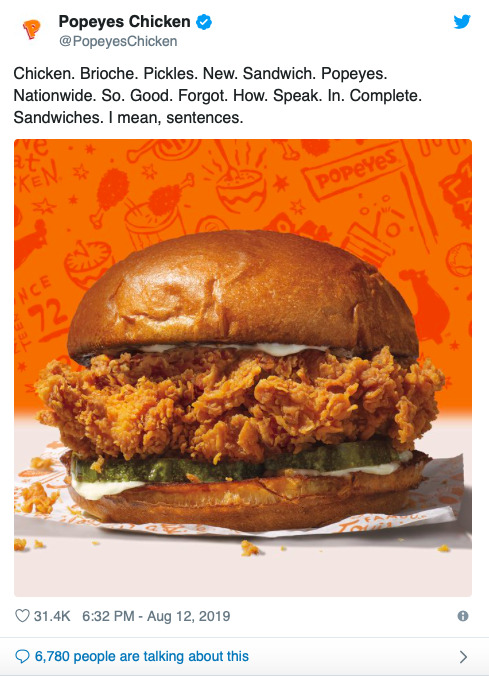
On Aug. 19, Chick-fil-A joined the conversation by tweeting: “Bun + Chicken + Pickles = all the ❤️ for the original” (Vermillion, 2019). On the same day, Popeyes responded to Chick-fil-A’s tweet with, “…y’all good?”
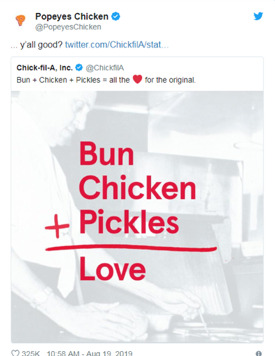
Chick-fil-A, a competitor nearly triple Popeyes size, started a Twitter “beef” that would unintentionally cause an increase in Popeyes’ sales and social media followers. Popeyes trended No. 1 on Twitter globally for nearly a week (Vermillion, 2019). Consumers of all kinds (celebrities, influencers, news outlets, customers, etc.) were debating and conducting taste-tests to figure out which fast-food chain had a better sandwich. Several other fast-food chains like Wendy’s – known to also have an incredible Twitter presence –tried to join the conversation but was unsuccessful. Local Popeyes’ restaurants were experiencing a high demand for the sandwich, causing waiting lines to become extremely lengthy. On social media, customers claimed they waited in lines that lasted at least 20-minutes before being able to order their food. Customers started tweeting and creating memes to show their support of their favorite chicken sandwich. Consumers' excitement lead to a premature sell-out two weeks after the sandwich went on sale (Maynard, 2019).
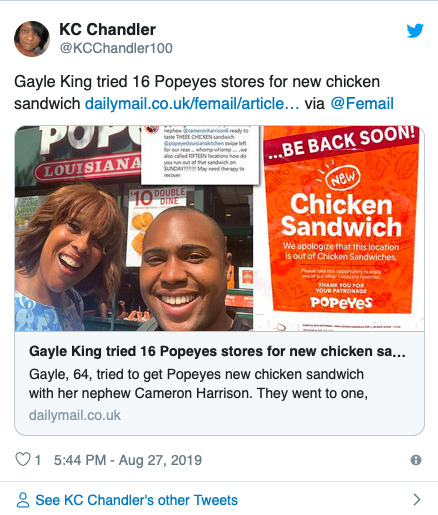
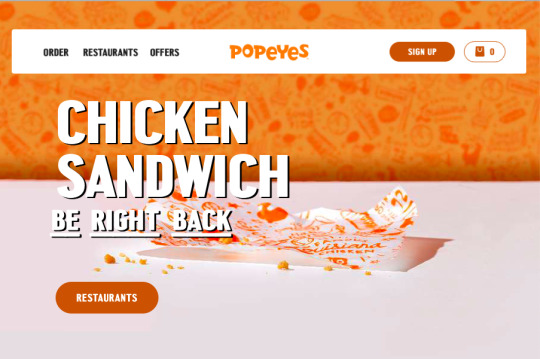
On Aug. 27, on Twitter Popeyes announced that they had sold out of chicken sandwich inventory (Lucas, 2019). The post included photos and a video of long lines across the U.S. with another playful caption: “Y'all. We know you love The Sandwich. Unfortunately, we're sold out (for now)."
Popeyes issued a statement stating that the company was working with its suppliers to bring back the sandwich. The demand for the sandwich exceeded very optimistic expectations. The fast-food chain had sold out of its inventory, which was expected to last through the end of September. It is rumored that that sandwich will make a return later this month (Thompson, 2019). Popeyes tried to keep consumer energy high by reassuring customers that they could receive push notifications on its app when the sandwich becomes available again. This was the end of the "Great Fried Chicken Sandwich Wars."
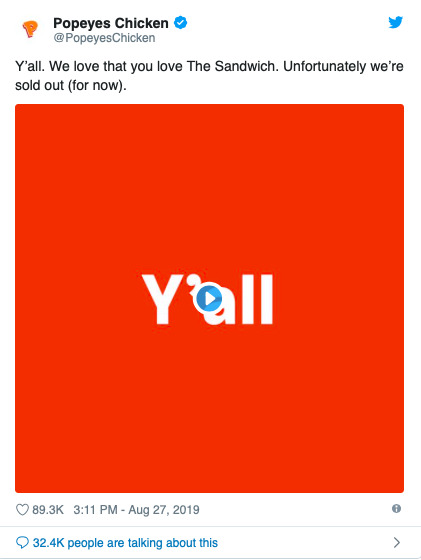
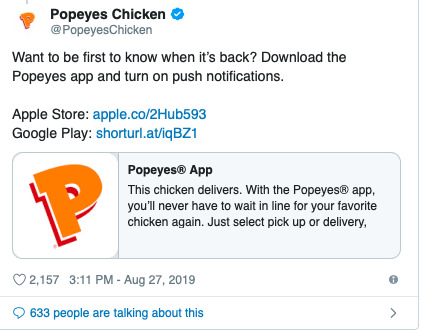
Reaction to Chick-fil-A vs Popeyes: “Love that Chicken from Popeyes”
This case study provides an assortment of key learnings for strategic communicators working on a product or campaign launch. Google Trends shows that Google searches for “Popeyes chicken sandwich” spiked by almost 1,000 percent, following the Aug. 19 tweets. Social media – in addition to other digital tactics – continues to evolve as an important component for Public Relations and Marketing professionals. Social media provides brands an opportunity to humanize themselves and to be creative. This case study tackled a very important debate between sales and communications professionals. By showing a positive correlation between social media metrics, raising reputation and awareness, but most importantly sales.
Apex Marketing group published a report shortly after the Twitter frenzy and discovered the following:1) Popeyes' response to Chick-fil-A’s tweet garnered more than $85,000 retweets and 300,000 likes. This includes a significant increase in engagement and boost in organic conversations. 2) Popeyes reaped an estimated $65 million in equivalent media value.
Although some journalists and critics might contribute Popeyes’ success to luck, I believe that it shows a high-level understanding of its consumer base and platforms being utilized. Popeyes and its agency took advantage of an opportunity that worked in its favor. Chick-fil-A took a risk to insert its self into the conversation and it simply backfired. In order to achieve high-levels of success on most social media platforms, brands must be willing to take calculated risks.
Page Principles
Popeyes and GSD&M handled this situation extremely well. The goal of this campaign was to launch Popeyes’ fried-chicken sandwich. Undoubtedly, with the assistance of Chick-fil-A, this campaign was extremely successful. Nevertheless, in my opinion, the business portion was the downfall of this operation (supply and demand). Although, according to the president of Apex Marketing, "Running out of supply is ideal economics." The page principles that apply to this case study are the following:
Remain Calm, patient, and good-humored: When analyzing the execution, Popeyes and GSD&M prepared an effective framework to manage for public relations success. All communication was promptly communicated on multiple platforms to reach an assortment of stakeholders (social media and Popeyes’ Newsroom). The team remained composed once locations started selling out of chicken sandwiches by issues a tweet that included visuals, a consistent tone and an application that provides updates once the product has been restocked. This case study is a great example of the importance of staying good-humored. Chick-fil-A’s tweet on Aug. 19 was created in good humor - something that is highly regarded on this platform. I highly doubt that Chick-fil-A intended to significantly improve Popeyes’ sells. Another example of good-humored PR practices was the decision to engage on social media in a way that captured a strong voice and showed a strong understanding of the brand's loyal fan base.
Prove it with action: After Popeyes issued a tweet informing consumers that the locations are expected to sell out of the sandwich, the company published another tweet informing customers that they could receive push notifications once the sandwich is available again. Studies repeatedly show that consumers appreciate when a company shows a level of accountability. By creating push notifications within the app, the company demonstrated follow-through. Proving that the new menu items will be returning.
Listen to stakeholders: The driving force behind the new menu item was stakeholder pressure. Consumers wanted a chicken sandwich and stakeholders wanted to compete with other fast-food chains. Unfortunately, employees working in these franchises were overlooked. Reports indicate that some Popeyes employees worked “more than 60-hour weeks” to keep up with overwhelming demand; everyone wanted to quit so bad because it was that bad” (Sugar, 2019).
References
Griner, D. (2019, August 23). Why Popeyes Is Positioned to Be the Next Great Brand Marketer. Retrieved October 20, 2019, from https://www.adweek.com/brand-marketing/why-popeyes-is-positioned-to-be-the-next-great-brand-marketer/.
Lucas, A. (2019, August 22). Chicken sandwich wars: Popeyes and Chick-fil-A feud on Twitter in bid to boost sales. Retrieved October 20, 2019, from https://www.cnbc.com/2019/08/22/chicken-sandwich-wars-popeyes-and-chick-fil-a-feud-on-twitter-in-bid-to-boost-sales.html.
Maynard, M. (2019, August 28). Popeyes Chicken Sandwich, Now A Sell-Out, Is A $65 Million Marketing Win. Retrieved October 20, 2019, from https://www.forbes.com/sites/michelinemaynard/2019/08/28/the-popeyes-chicken-sandwich-now-sold-out-is-a-65-million-marketing-win/#52f699e279d6.
Maynard, M. (2019, August 27). Popeyes, Which Created A Fried Chicken Sandwich Frenzy, Is Now Sold Out. Retrieved October 20, 2019, from https://www.forbes.com/sites/michelinemaynard/2019/08/27/popeyes-which-created-a-fried-chicken-sandwich-frenzy-is-now-sold-out/#1279ec994463.
Maynard, M. (2019, October 3). Who Bought The Popeyes Chicken Sandwich - And Will They Be Back When It Returns? Retrieved October 20, 2019, from https://www.forbes.com/sites/michelinemaynard/2019/10/03/who-bought-the-popeyes-chicken-sandwich--and-will-they-be-back-when-it-returns/#1d7d142c1eca.
McLymore, A. (2019, August 23). Popeyes spicy chicken sandwich launch heats up social media. Retrieved October 20, 2019, from https://www.reuters.com/article/us-restaurant-brands-popeyes-sandwich/popeyes-spicy-chicken-sandwich-launch-heats-up-social-media-idUSKCN1VD2EO.
Sugar, R. (2019, August 28). The long, fraught, delicious history of fried chicken sandwiches. Retrieved October 20, 2019, from https://www.vox.com/the-goods/2019/8/28/20836936/popeyes-chick-fil-a-fried-chicken-sandwich-twitter.
Thompson, K. (2019, October 21). When Is Popeyes' Chicken Sandwich Coming Back? Clues Point to Soon. Retrieved October 21, 2019, from https://www.thrillist.com/news/nation/when-is-popeyes-chicken-sandwich-back-still-sold-out.
Vermillion, S. (2019, August 27). By Sparking A Sandwich War With Popeyes, Did Chick-Fil-A Royally Screw Up? Retrieved October 20, 2019, from https://www.huffpost.com/entry/popeyes-chick-fil-a-chicken-sandwich_l_5d652d8ee4b0641b25537080?guccounter=1&guce_referrer=aHR0cHM6Ly93d3cuZ29vZ2xlLmNvbS8&guce_referrer_sig=AQAAAM0DvxwJ6G0pQ5uDRCbz6bMV8-Dw-ozvvrrt6W5BSdMIWOpxjuDCw-A2iVlwK76e8G2DEql8HdRQnQAQYAVtj2lN29a5tzLKWyYAc_Zj27ezZy5aZmE_cTIZm3k9k5qGTdQjBlYu4Qb5vfEmyKagJoP8B-MRIIkszmY_CZUvVzLw.
Yaffe-bellany, D. (2019, August 21). A Popeyes Chicken Sandwich and a Tactic to Set Off a Twitter Roar. Retrieved October 20, 2019, from https://www.nytimes.com/2019/08/21/business/popeyes-chicken-sandwich-twitter.html.
0 notes
Text
Thomas Cooked - the collapse of the oldest company in travel and their continued communication failures
By Matt Forner
SUMMARY: In the early morning hours of Monday, September 23, Thomas Cook Group PLC, formally announced bankruptcy and their entering into compulsory liquidation under U.K. law after failing to secure a £200 million loan from its bankers and the partially government-owned/taxpayer-controlled Royal Bank of Scotland (RBS). The world’s oldest travel company, which began in 1841, was closing its doors after 178 years. Sadly, the company known as one of Europe’s top no-hassle travel companies left 600,000 stranded passengers across the globe.

The United Kingdom, the largest Thomas Cook market, had 155,000 passengers stranded, triggering the largest peacetime repatriation effort in U.K. history. The Civil Aviation Authority (CAA), the United Kingdom’s equivalent to the Federal Aviation Administration (FAA), launched Operation Matterhorn to return all stranded passengers carrying a British passport. In total, the U.K. government paid for 150 aircraft from 50 partners which flew 746 individual flights at the cost of £600 million. The collapse also left 21,000 employees without work, many finding out of their job loss while still operating aircraft and flying 35,000 feet in the air. This horrendous situation must cause us to ask, what happened, and how did Thomas Cook’s failure to communicate successfully impact this disaster?
To understand the true scope of the Thomas Cook fiasco, it’s important to first understand who they were as a company and the massive scale at which they operated. At their collapse, Thomas Cook was known throughout Europe as one of the top low-cost, leisure-specific travel companies operating tours in Africa, Asia, Europe, North America, South America, the Middle East. Along with operating tours, Thomas Cook owned 550 brick-and-mortar travel agencies, 380 hotels and resorts, 17 ocean liners and cruise ships, and 151 aircraft flying to 82 destinations on almost every continent. They truly were a behemoth in the travel sector with their airline and travel stores being the crown jewels.


Despite their massive brand awareness, popularized in Europe by the advertising slogan, “Don’t just book it, Thomas Cook it,” as synonymous with their brand as their name, Thomas Cook failed to make the jump into the digital age throughout the 2000s.

In direct competition with Thomas Cook was a flooded air market comprised of easyJet, RyanAir, Norwegian, Vueling, WIZZ, Eurowings, Thomas Cook sister-company, Condor, and German leisure-specific airline and travel group, TUI. All carried lower overhead, focusing on one or two travel and hospitality segments, compared to Thomas Cook who had high fixed costs. The increasing usage of the internet offered more targeted travel experiences and companies including Kayak, Expedia, Priceline, Travelocity, Orbitz, TripAdivsor, Hostelworld, and Airbnb began to chip away at Thomas Cook’s travel store business, many times offering cheaper deals through multiple airline carriers and hospitality groups and undercutting Thomas Cook by not needing in-store travel agents. Partnerships between online travel booking companies and low-cost carriers also increased, many times leaving all of the Thomas Cook ventures out of the equation.

As travelers gained a plethora of options when it came to booking inexpensive flights, guided tours, and accommodations, the demand for a traditional all-inclusive, package style, physical travel agency, and tour company had changed. Furthermore, changes in travel attitudes and apprehension surrounding Brexit led to the gaining of popularity of staycations and less-expensive regional, European-based travel. For many Europeans, particularly Britons, travel has become cheaper, more frequent, less extravagant, and shorter in duration. Younger travelers are able to book inexpensive last-minute flights and hostel accommodations in a matter of minutes and older travelers can book a condo and private tours inexpensively halfway around the world. All these factors lead to less interest in an all-inclusive, long-duration, tour-based travel company like Thomas Cook.
Throughout the days and hours leading up to the collapse, all seemed normal. Thomas Cook flights were taking off and landing, tours were commencing, flights could still be booked on their website, and customer service employees were responding to passengers on Twitter. Thomas Cook sent their final tweet on September 22 at 9:40 p.m., reassuring a passenger that their travel plans would not be affected.
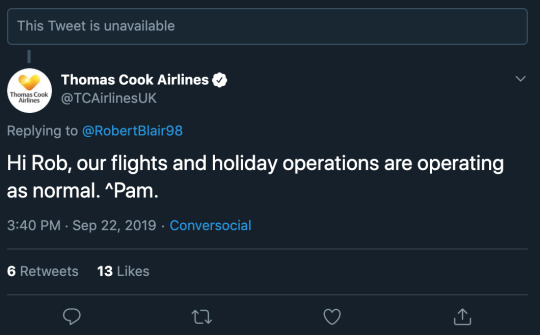
Without the public’s knowledge, an emergency overnight meeting between executives and creditors was taking place to look for any possible path forward. The airline had only roughly $200 million in liquid cash assets on hand and without an immediate cash infusion via a new loan, the 178-year-old company would shutter. Nobody outside the meeting knows exactly what was said in the room or what stalled negotiations, but it decided, that Thomas Cook was no longer able to operate and at 3:01 a.m., the Civil Aviation Authority took over Thomas Cook’s twitter and released the official statement of insolvency.

All around the world, at their very moment of insolvency, flights were boarding, planes were fueling, crews were preparing for takeoff, and passengers were ready to leave for vacation or head home. But at that moment, the company was gone. Everything had to stop. Pilots and flight crews were no longer employees, the fuel that just entered the plane would not be paid for, and planes were no longer owned or leased by the airlines. Travelers now faced a harsh reality. Their flight was canceled indefinitely and there wasn’t an airline to call to re-book. The Civil Aviation Authority (CAA) was now tasked with bringing home nearly 155,000 British travelers in the largest peacetime repatriation effort in U.K. history, codenamed Operation Matterhorn.
REACTION & PR Case Analysis: It’s clear on multiple levels where Thomas Cook messed up and directly walked into a major public relations, corporate communications, and brand reputational crisis. First off, Thomas Cook violated multiple Page principles, particularly numbers 3, 4, 5, and 7. As you will see, the cascading effect of violating multiple principles only further deepened the communications crisis.
3) Listen to stakeholders – Thomas Cook did not listen to stakeholders, both inside and outside the organization as they were heading toward an ultimate collapse. Numerous times multiple groups voiced concerns surrounding changing attitudes in travel with Thomas Cook reacting far too slowly to the high maneuverability of the digital age. This culminated in 2011 with a near-collapse in the business as stocks plummeted 75.2 percent as reports details Thomas Cook was seeking a £100m loan to prop up failing aspects of the business.
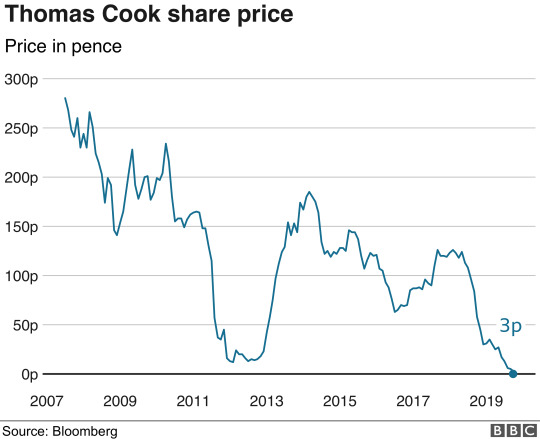
Following this event, stakeholders inside and outside the organization demanded a split in the company, separating the more profitable airline from portions of the business that were experiencing slowdowns, such as the hospitality and package tour operations. Thomas Cook leadership responded by slashing the number of travel stores from over 3,000 to just 550 and selling off expensive portions of the business. However, further calls from stakeholders to bring the business fully into the digital age were repeatedly rejected by Thomas Cook leadership and instead, a full re-branding campaign was executed in 2013.
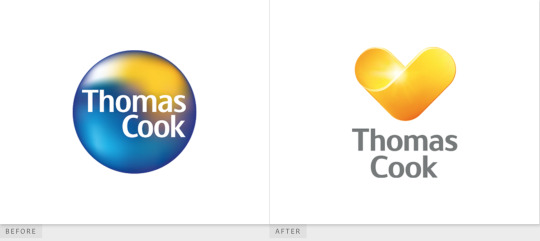
4) Manage for tomorrow – Thomas Cook failed to manage for tomorrow by continuously ignoring call after call to reorganize the company from stakeholders. Investors, financiers, members of the pilots union, and non-union staff across the organization called for a response to the changing travel and tourism industry. Furthermore, in the final days and hours of the business, when Thomas Cook leadership knew the business was certainly doomed, no effort was taken to help soon-to-be stranded passengers or provide an easy transition for employees. Twitter handle, @ThomasCookCares was taken down as it became clear the company cease to exist, offering stranded passengers and crew no way to contact the airline.
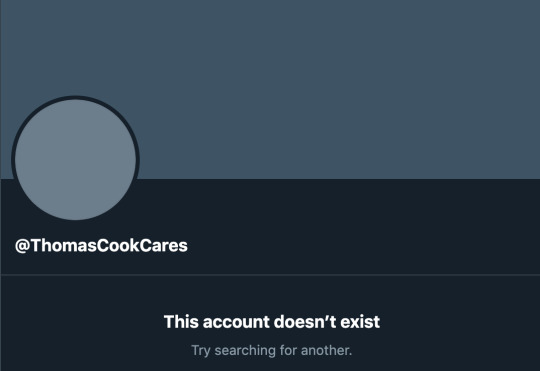
5) Conduct public relations as if the whole enterprise depends on it – Clearly, this was not Thomas Cook’s objective. During the final days of Thomas Cook’s operation, when it was clear to executives that their company was collapsing, leadership waited and failed to take accountability for the oncoming disaster. Not only did they not notify employees, passengers, or other key stakeholders, they failed to operate their business with a public relations mindset. To them, it was easier to delay the inevitable until the final moment when they could shut their doors and walk away without having to deal with the fallout. Of course, that fallout left 600,000 passengers and 21,000 employees stranded and out of work.
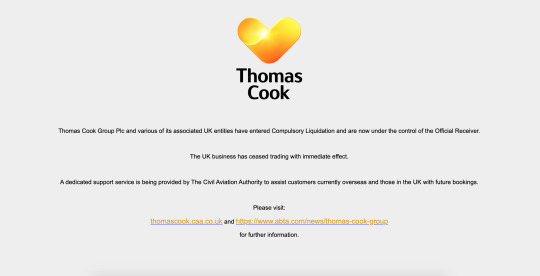
7) Remain calm, patient and good-humored – Thomas Cook failed at this principle by walking away from the disaster and not even attempting to fix their mistakes. Instead, the government and Thomas Cook’s competitors had to step in to fix the mess Thomas Cook created. Multiple airlines, including major competitors such as British Airways, Virgin Atlantic, and easyJet offered reduced fares for passengers needing repatriation, as well as stating they would create a special hiring division to bring Thomas Cook employees jobs. This lack of an effort on Thomas Cook’s part to remain calm, handle the situation as professionally as possible, and focus on.
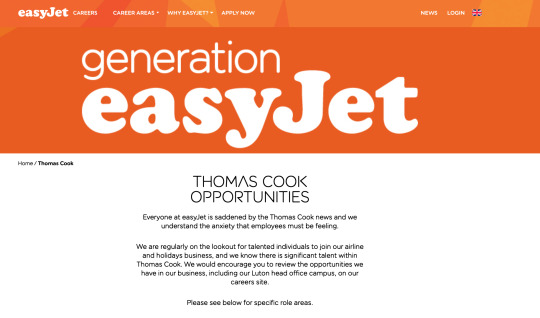
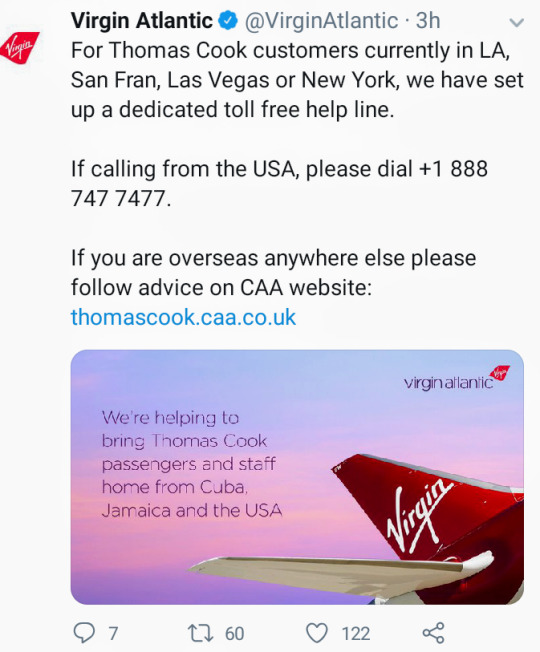
Sources:
- Cummins, Nicholas. 2019. "What Went Wrong For Thomas Cook?" Simple Flying, September 23. - Denise Roland, P.R. Venkat. 2019. "Thomas Cook Shuts Down, Forcing Britain to Fly Thousands Home." The Wall Street Journal, September 23. - Gill, Oliver. 2019. "Thomas Cook and RBS play blame game amid struggle for survival ." The Telegraph, September 20. - Hayden-Lefebvre, Thomas Jérémie. 2019. "The Impact of Thomas Cook’s Collapse on Tourism." Simple Flying, September 27. - James Hookway, Denise Roland. 2019. "First Dunkirk. Now, the Collapse of Thomas Cook." The Wall Street Journal, September 23. - Perez, Irene Garcia, and Luca Casiraghi. 2019. "Thomas Cook’s Liquidation Step by Step And What Happens Next." Bloomberg, September 23. - PRESS, ASSOCIATED. 2019. "Tour company Thomas Cook collapses, stranding hundreds of thousands of travelers ." The Los Angeles Times, September 23. - Shane Hickey, Helena Smith. 2019. "Thomas Cook staff and European tourist trade left reeling after collapse." The Guardian, September 29. - Sims, Shannon. 2019. "How Could Travel Giant Thomas Cook Fail?" The New York Times, September 23. - Sindreu, Jon. 2019. "What Thomas Cook’s Collapse Says About Modern Tourism ." The Wall Street Journal, September 23. - Wembridge, Mark, and Roger Blitz. 2011. "Thomas Cook plunges on debt concerns." Financial Times, November 22. - 2019. Why So Many Airlines are Going Bankrupt. Directed by Sam Denby Wendover Productions.
#travel#tourism#thomascook#communication#internal communication#corporate communication#public relations#prad564#airlines
0 notes
Text
Forever 21 Filing for Bankruptcy
By Suhani Shah
Summary
Forever 21 is an American clothing industry that started back in 1981 by Don Won and his wife Jin Sook. It’s been based off of Los Angeles, California, which was also first named Fashion 21 but then was changed to Forever 21. This company sells women and men’s clothing, as well as women accessories and beauty products. The first store was opened with $11,000 and it started growing immensely, then opened up stores all around the US.
https://www.youtube.com/watch?v=YzcS4XYW6Is
On September 2019, Forever 21 filed for Chapter 11 bankruptcy. This is bankruptcy for large corporations that need time to reorganize their company to keep their business alive. It was also recently announced that most of the international stores would be closing down, along with roughly 200 US stores. They expanded and immensely grew over the years. However, they now are over $500 million dollars in debt (Business Insider). Unfortunately, annual sales are decreasing 20-25% according to Forbes (Forbes).

Analysis
A forever 21 reputation has turned into a downfall. They are known to have inexpensive material that is not very long lasting. Consumers are becoming environmentally cautious about the material as well, and they think stores tend to be very unorganized. The consumers aren’t attracted to their oddly graphic tee’s that are not very fashionable. Compared to other competitors they don’t have much of an engagement to e-commerce such as; Fashionova.
Many stores have already started their sales since most of them are closing down. However, consumers on twitter think the main reason they’re in bankruptcy is because of the material their merchandise is made up of. Also, the types of graphics they have on their clothing, which doesn’t make it tempting to shop there.
According to Arthur W. Page Principles Telling the Truth principle, the CEO didn’t take any action in speaking or engaging with their consumers about the bankruptcy. Although, the CEO mentioned, “Once we complete a reorganization, Forever 21 will be a stronger, more viable company that is better positioned to prosper for years to come (Business Insider).” This would apply to the Listening to Stakeholders principle. As the CEO is able to speak up and talk about improving his company by reorganizing and making it a stronger company overall.

Conclusion In conclusion, this issue is still in recent news and may have a good potential outcome to become a more thriving company if the CEO is willing to reorganize the company. The CEO would have to make an effort to turn Forever 21 into more of an e-commerce store. There should also be more effort taken into the material and trending styles. With just about 200 stores closing, there still might be hope within the company to persuade consumers to keep shopping at Forever 21.
Citations Rogers, Taylor Nicole. “Forever 21 Just Filed for Bankruptcy - and the Husband and Wife Duo Who Founded It Have Lost Nearly $4 Billion from Their Personal Net Worths since 2015.” Business Insider, Business Insider, 30 Sept. 2019, www.businessinsider.com/forever-21- jin-sook-do-won-chang-lost-billionaire-status-2019-7.
Debter, Lauren. “Forever 21 Files For Bankruptcy, Will Shutter Over 100 Stores.” Forbes, Forbes Magazine, 30 Sept. 2019, www.forbes.com/sites/laurendebter/2019/09/29/ forever-21-files-for bankruptcy-store-closures/#11ba86eb3159.
0 notes
Text
Walmart Cracks Down on Gun Violence
BY: Ashley Bondarowicz
SUMMARY: Walmart is the United State’s largest retailer, who made more than $514.4 billion last year in total revenue (+3% compared to YA). They employ more than 2.2 million people globally, making them the largest private employer in the United States. On August 3rd, the lives of Walmart shoppers and employees were at risk when an active shooter attacked one of their El Paso, TX store locations. Patrick Crusius, 21 of Allen, TX, shot and killed 20 people and injured 26 others after opening fire with an AK-style semiautomatic rifle. This shooting was one of the deadliest mass shootings in American history. Additionally hours after the shooting in El Paso, America experienced another mass shooting in Dayton, OH (Petersen, 2019) and days later in Midland-Odessa, TX, making a total of 283 mass shootings this year.

After spending weeks attending to victims, speaking with their associates/impacted families, and cooperating with law enforcement Walmart stated they have a duty to help “make the country safer” and that the current “status quo is unacceptable” (McMillon, 2019). On September 3rd, Walmart’s CEO, Doug McMillon, put out a press release on their next steps in response to the tragedies that occurred in their store. The press release announced the following changes to be put into effect…
After selling through their current inventory commitments, Walmart will discontinue sales of short-barrel rifle ammunition such as the .223 caliber and 5.56 caliber that, while commonly used in some hunting rifles, can also be used in large capacity clips on military-style weapons;
Walmart will sell through and discontinue handgun ammunition; and
Walmart will discontinue handgun sales in Alaska, marking our complete exit from handguns.

These changes in actions are expected to reduce Walmart’s market share of ammunition from 20% to approximately 6% to 9%. Walmart was responsible for 2% of firearm sales in 2019 (Peterson, 2019). On Walmart’s Q2 earnings call McMillion suggested “quitting guns wouldn’t make much difference to Walmart, amounting to less than $600 million, or under 0.2 percent, of its total US revenue”. McMillion stated that shareholders have generally been in support as they see the duty to respond to given the little influence guns have on their overall revenue. However, contrary gun advocates, specifically the National Rifle Association, called the decision “shameful” and predict that “Lines at Walmart will soon be replaced by lines at other retailers who are more supportive of America’s fundamental freedoms” (Nassaer, 2019).

ANALYSIS:
Walmart’s response to the events that occurred in early August is a true representation of applying the “Page Principles” to effectively communicate their response to the tragedy at their stores. The principles of prove it with action, listen to stakeholders, and conduct public relations as if the whole enterprise depends on it, were all executed to help Walmart navigate the crisis.
Listening to Stakeholders and then prove it with Action: While these are two different Page Principles together they very accurately describe how Walmart correctly responded to crises. When the shootings in El Paso first occurred Walmart issued a statement the day of on Twitter offering condolences to those affected. They actively stated via social media that they would be cooperating with law enforcement and report back on the next steps. Responses on Twitter were negative. Many commenters asked Walmart to stop selling guns and take action vs. offering their thoughts and prayers. This sparked the #Boycottwalmart. The day following the tragedy they took a first step in providing action by posting on Twitter and via press release to state that they were donating funds to the El Paso Community Foundation, providing support to their employees, and donating food and water to local reunification centers and area hospitals. While sentiment was more positive tweets still indicated that people were going to #boycottwalmart unless they took steps to alleviate the root of the problem. Walmart heard the response from the public by deciding to end sales of certain rifle ammunition. Walmart received much accreditation for doing so in an active and timely manner.

Conduct public relations as if the whole enterprise depends on it: Businesses are challenged when they have to take into account the stakeholders and shareholders. Walmart effectively balanced both the stakeholder and shareholder in this decision by addressing all of them in their press release and Q2 earnings call shared in early September. For employees and customers, McMillion promised a safe environment asking people to avoid carrying firearms inside of store locations. Store managers also were given the ability to ask someone with a firearm to leave the store. When addressing gun rights advocates he assured them that the company would focus its gun business entirely on supplying rifles and ammunition for hunters; “We have a long heritage as a company of serving responsible hunters and sportsmen and women, and we’re going to continue doing so,” (Cokery, 2019). Lastly, the press release addressed key shareholders over their concern that limited ammunition sales could prevent a decrease in revenue. While their share will decrease up to 11% it represents an overall small portion of their total revenue. Since stocks are showing a steady increase since events took place in August. Walmart was in a difficult situation here, but they appear to have balanced both stakeholders and shareholders well in a way that will protect and build the brand.
Walmart’s reaction has started a chain reaction of other U.S. based companies responding to America’s gun crises. Our September 12th, 145 CEOs sent congress a letter demanding action on gun control, despite backlash from the NRA. Other Retailers have backed Walmart,(Walgreens, CVS, and Kroger) by asking shoppers to not openly carry firearms in stores (Nguyen, 2019). Walmart set the bar on how to respond to social responsibility. While their decision could be controversial they have yet to see any detrimental effects on their business.

Sources:
Baer, D. (2019, September 4). Walmart is cautiously rolling out its own gun control, and it's a sign of how major companies are starting to value more than just profits. Retrieved from https://www.businessinsider.com/walmart-changing-gun-rules-shifts-corporate-governance-2019-9.
Corkery, M. (2019, September 3). Walmart to Limit Ammunition Sales and Discourage 'Open Carry' of Guns in Stores. Retrieved from https://www.nytimes.com/2019/09/03/business/walmart-guns-ammunition-sales.html.
FY2020 Q2 Earnings Release. (2019, August 15). Retrieved from https://corporate.walmart.com/newsroom/events/fy2020-q2-earnings-release.
McMillon to Associates: Our Next Steps in Response to the Tragedies in El Paso and Southaven. (n.d.). Retrieved from https://corporate.walmart.com/newsroom/2019/09/03/mcmillon-to-associates-our-next-steps-in-response-to-the-tragedies-in-el-paso-and-southaven.
Nassauer, S. (2019, September 4). Walmart to Stop Selling Ammunition for Assault-Style Weapons. Retrieved from https://www.wsj.com/articles/walmart-to-stop-selling-ammunition-for-assault-style-weapons-11567530289?mod=wsj_villanova3.
Neff, J. (2019, August 21). Walmart content to be No. 4 in U.S. gun sales-and might do better even lower. Retrieved from https://adage.com/article/cmo-strategy/walmart-content-be-no-4-us-gun-sales-and-might-do-better-even-lower/2192836.
Perspectives, R. M. K. B. (2019, September 6). Opinion: Walmart CEO's decision on guns is the kind of corporate courage we need. Retrieved from https://www.cnn.com/2019/09/06/perspectives/walmart-ceo-guns-courage/index.html.
Peterson, H. (2019, September 3). Walmart will bar shoppers from openly carrying guns in its stores and stop selling some ammunition in response to 2 deadly shootings. Retrieved from https://www.businessinsider.com/walmart-bans-open-carry-guns-stops-selling-some-ammunition-2019-9.
Sauter, M. B., & Suneson, G. (2019, May 28). Who is the largest employer in your state? Walmart top in nation with Amazon second. Retrieved from https://www.usatoday.com/story/money/business/2019/03/30/largest-employer-each-state-walmart-top-us-amazon-second/39236965/.
Silverstein, J. (2019, September 1). There have been more mass shootings than days this year. Retrieved from https://www.cbsnews.com/news/mass-shootings-2019-more-mass-shootings-than-days-so-far-this-year/.
Taylor, C. (2019, September 5). Why Walmart's New Gun Policies Are Good For Its Brand. Retrieved from https://www.forbes.com/sites/charlesrtaylor/2019/09/04/why-walmarts-new-gun-policies-are-good-for-its-brand/#74b457917781.
The Page Principles. (n.d.). Retrieved from https://page.org/site/the-page-principles.
Walmart Announces $400,000 in Support of the El Paso Community. (n.d.). Retrieved from https://corporate.walmart.com/newsroom/2019/08/07/walmart-announces-400-000-in-support-of-the-el-paso-community?linkId=100000007412209.
0 notes
Text
To Shave Or Not To Shave? Billie Razors Doesn’t Care
By Isabel Rejto

Source: https://www.theverge.com/2017/11/14/16648814/billie-womens-dollar-shave-club
Summary of the Brand and the Campaign
Female-first startup razor company Billie launched in 2017 amid the successes of other subscription-based razor companies, but with a twist: their products are made for women’s shaving needs. Not only in terms of quality, but in terms of price. Shaving and all its associated costs tend to drain a woman’s bank account, so Billie answered women’s prayers and found a way to make women’s lives easier on their wallets.
The subscription service sells a host of shaving and body products without the added pink tax, the practice of marking up women’s personal care products when the men’s equivalent is half the price. The starter kit is priced at $9 and comes with a handle, two five-blade cartridges, and a magnetic holder. Although a handful of pledges were made, promises to tackle the pink tax were slow-progressing, until Billie arrived on the scene. Beyond pricing their products more in line with what men pay for identical products, the company offers a Pink Tax Rebate, too. Each time a customer refers a friend, they receive a reward even if that person only clicks through, which means they don’t have to even buy anything for the person who referred them to earn money.

Billie razors. Source: https://mybillie.com/pages/get-started#step2

Ad-on products to the Billie razor. Source: https://mybillie.com/pages/get-started#step4
The company’s mission is to provide quality shaving supplies and premium body care products.

Source: https://mybillie.com/pages/about
In 2018 Billie launched Project Body Hair, a campaign featuring women with unibrows and underarm hair, after realizing “there was a lack of representation of female body hair.” Georgina Gooley, Billie co-founder said the company’s main goal is to normalize body hair and change the conversation around it by featuring body hair in its advertisements. Although the concept of hairlessness is a modern invention of a social requirement, a pro-body hair movement on social media is finally gaining traction. Women have begun embracing the hashtags #leghairdontcare, #hairywoman, and #bodyhairdontcare. To this end, Gooley felt that “showing smooth, hairless legs seemed like an archaic way of representing women.”
Project Body Hair Campaign: https://www.youtube.com/watch?v=P4DDpS685iI
Now, in 2019, the company has shown no signs of slowing down its disruptive force in the shaving market. Last year’s campaign earned Billie a round of applause and praise for its depiction of hair on women’s legs. To continue with this theme, the company chose to drive the idea home that shaving is a choice. Billie’s June 2019 campaign, “Red, White, and You Do You” continues to de-stigmatize the taboo of women’s body hair. This is all part of the company’s envelope-pushing style of marketing, which essentially means pushing the boundaries of what is the norm to gain attention. Though it may seem odd for a razor company to advocate for body hair, the campaign’s film director Ashley Armitage saw the project as a commentary on women’s choices.
She wants “people to feel free to do what they want with their bodies this summer and every summer. Body hair is a personal choice. Shaving it, waxing it, or growing it are all valid, and all up to the individual.”
Since this campaign is a continuation of last year’s, it only seemed fitting to expand its reach. Once it was over, Billie donated the campaign’s photography to Unsplash to bring diverse images to a widely-used stock photography site. In an effort to engage with the customers, Billie encouraged followers to take a picture of their body hair with the hashtag #projectbodyhair and also upload them to the campaign site if they wanted to do so.
2019 campaign: https://www.youtube.com/watch?v=XYsacX9LwSw
Naturally, there were mixed reactions to both campaigns, but overall Billie has managed to solidify its brand image and continue to deliver on its promise of affordable products and the empowerment of women.




Reaction to the Campaign
I believe Billie has proven itself to be more than just a start-up at this point. Project Body Hair, in my opinion, is on par with other campaigns like Dove’s multiple campaigns for real beauty, and the Always #LikeAGirl campaign. Similar to these companies, Billie has taken care to ensure their communications objectives align with their mission and business goals. Putting female customers first has always been their key objective and pushing boundaries has always been their mission. I believe this campaign hits on a number of Page principles, including ‘tell the truth,’ ‘listen to stakeholders,’ and ‘conduct public relations as if the whole enterprise depends on it.’ One area in need of improvement is the need to ‘prove it with action’ - specifically through much-needed transparent communication.
Tell the truth: Project Body Hair and 2019′s “Red, White, and You Do You” campaign, both present the truths of the organization at every step possible. Both the project and the campaign speak to Billie’s internal truth of creating products for women but also point to the value it places on female customers and communicating and reflecting their truths, too.
Listen to stakeholders: Billie has effectively listened to its stakeholders and recognized that women are becoming more autonomous in the area of shaving and are becoming more and more comfortable with growing out their hair. The point of the current campaign is to celebrate how women use or don’t use razors because the choice is theirs. By understanding what is important to Billie’s female customer base, the company was able to use and I hope continues to use, public relations in a meaningful way to positively contribute to its brand image.
Conduct public relations as if the whole enterprise depends on it: The two campaigns released by Billie speak to its understanding of this principle. In a world in which consumers are looking to brands that hold the same values as them, making this important in any communications is imperative. I personally haven’t yet made the switch to Billie, I share the same values in that I’ve always believed women should be granted autonomy in the decisions they make about their own bodies.
Prove it with action: Although Billie does give back by donating 1% fo all its revenue to women’s causes all over the world, supporting Every Mother Counts, a campaign for safer pregnancy and childbirth, last year, I don’t think the company is doing enough. In my opinion, it’s not enough to say a partnership is in effect, or that donations are being made, without proving it through transparent communications. I also think Billie should consider donating and supporting female-led startups to spread its key tenet of empowerment.
Sources
Always. (2019). “Our Epic Battle #LikeAGirl.” Always. Retrieved from https://always.com/en-us/about-us/our-epic-battle-like-a-girl
Belam, Martin. (2018, 1 July). “Hair, hair: users applaud razor ad that shows women actually shaving.” The Guardian. Retrieved from https://www.theguardian.com/lifeandstyle/2018/jul/01/billie-womens-razors-hair-ad-shaving
Billie. (2019). “About.” Billie. Retrieved from https://www.mybillie.com/page/about
Billie. (2019). “Pink Tax.” Billie. Retrieved from https://www.mybillie.com/pages/pink-tax
Billie. (2019). “Project Body Hair.” Billie. Retrieved from https://www.mybillie.com/pages/projectbodyhair
Chen, Connie. (2019, 21 August). “Billie vs. Flamingo Razors - How 2 Startups Trying to Change Women’s Shaving Stack Up.” Business Insider. Retrieved from https://www.businessinsider.com/flamingo-vs-billie-razor
Concept Marketing. (2014, 12 June). “Pushing the Envelop:.” Concept Marketing. Retrieved from https://conceptmrk.com/2014/06/12/pushing-the-envelope/
Dove. (n.d.). “Dove campaigns.” Dove. Retrieved from https://www.dove.com/us/en/stories/campaigns.html
Gould, Hallie. (2019, 30 June). “16 Beauty Brands That Empower Women With Every Purchase.” Byrdie. Retrieved from https://www.byrdie.com/beauty-brands-that-empower-women
Lukas, Erin. (2018, 26 June). “There Has Never Been Any Body Hair in a Women’s Shaving Ad - Until Now.” InStyle. Retrieved from https://www.instyle.com/news/billie-razors-project-body-hair-campaign
Nussbaum, Rachel. (2017, 4 November). “Billie’s Razor Subscription Service Is Paying Women Back for the Pink Tax.” Glamour. Retrieved from https://glamour.com/story/billie-razor-subscription
Robin, Marci. (2019, 27 June). “Billie’s New Ad Campaign Celebrates Personal Choice by Showing Unshaven Bikini Lines and Underarms [Update].” Allure. Retrieved from https://www.allure.com/story/billie-razor-ad-campaign-unshaven-pubic-underarm-hair
Singh-Kurtz, Sangeeta. (2019, 24 July). “A new razor brand is encouraging women not to shave.” Quartz. Retrieved from https://qz.com/quartzy/1672807/razor-brand-billie-is-encouraging-women-not-to-shave-their-body-hair/
The Page Principles. (n.d.). Arthur W. Page Society. Retrieved from https://page.org/site/the-page-principles
0 notes
Text
Wayfair Missteps in Employee Walkout
By Joshua Smyser-DeLeon
Summary of the Wayfair Walkout
Wayfair is a Boston-based e-commerce website that sells furniture and other home decor. They use a drop ship model to get their products into the hands of customers. A drop ship model is when a retailer buys a product, ordered by a customer, from its suppliers and has that product shipped to the customer that placed the order. For example, when you buy a lamp from Wayfair, Wayfair will buy that lamp from a supplier and have it shipped to you for the price you agreed to pay via their website. This means they never physically have the products they sell. With this model, Wayfair is able to sell over 14 million items. It has 11,000 suppliers as well as five additional websites Joss & Main, AllModern, Perigold, and Birch Lane. In 2018 alone, it made $1.5 billion in gross profit (Wischhover, 2019).
youtube
In mid-June 2019, Wayfair employees discovered that the Baptist Child and Family Services (BCFS), a detention center operator, placed a $200,000 bedroom furniture order. This bedroom furniture was for a migrant detention center housing children in Carrizo Springs, Texas (Bhattarai, 2019). In reaction, on June 21st around 540 Wayfair employees signed and sent a letter to executives challenging the ethics of the current and future B2B sales (Mabud, 2019). Executives responded with their own internal letter acknowledging the concerns of their employees, but that the order would still be fulfilled. In response, over 500 employees staged a “Wayfair Walkout” to protest the company’s business conduct on June 26th.

A Twitter account, @wayfairwalkout, was also created and the following demands were tweeted on the day of the walkout.
commitment to requests made in employee letter
donate profits of sales from BCFS and similar contractors to the Refugee and Immigrant Center for Education and Legal Services (RAICES)
stop doing business with BCFS and similar contractors
create a code of ethics for B2B sales
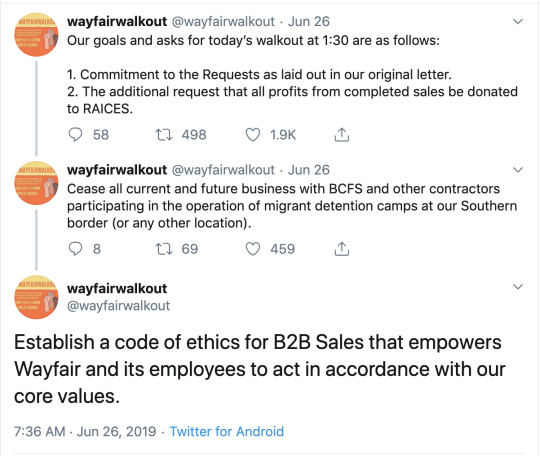
It is worth noting that these were not disgruntled employees. Organizers were quoted as saying, “We love Wayfair & working there. We don’t want to smear the CEOs. We just want to be able to feel proud of the work we do there.” (Matsakis, 2019). After the walkout, Wayfair still continued with the sale. Steve Conine and Niraj Shah, co-founders of Wayfair, announced a donation of $100,000 to the American Red Cross, not RAICES, in another letter to employees (Klar, 2019).
Reaction to the Wayfair Walkout
The “Page Principles” of telling the truth, proving it with action, and conducting public relations as if the whole enterprise depends on it could have all helped Wayfair navigate this situation (The Page Principles, n.d.). Let’s start with telling the truth.
youtube
Tell the Truth: On social media, the walkout gained attention. Unfortunately, Wayfair did not acknowledge the walkout or B2B sale on any of their social media channels. However, users expressed their displeasure with the sale in the comments section of the company’s Facebook, Instagram and Twitter pages. Protest organizers created a Twitter account the day before the walkout with the handle @wayfairwalkout. It had 22,000 followers by the day of the protest (Bhattarai, 2019). Elected officials, such as Rep. Alexandria Ocasio-Cortez (D-N.Y.) and Sen. Elizabeth Warren (D-Mass.), added their voices to the discussion as well.
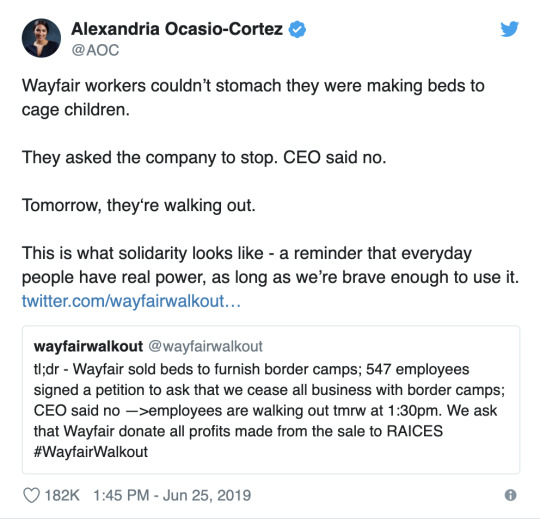
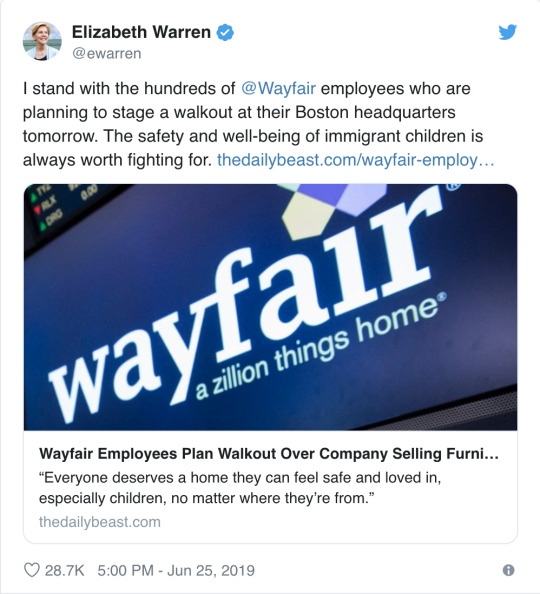
The employees that took part in this protest may have only represented 10 percent of the Wayfair workforce, but they were able to bring national attention to the ethical dilemma corporations may face when doing business with government contractors, especially as it relates to and reflects their stated company values.
youtube
In this case, Wayfair missed an opportunity to share why this sale reflected its values to its employees as well as to the public via their social media channels. In its mission statement, the company states that they “partner with organizations that play a meaningful role in creating safe and comfortable living spaces” and that they want to "make home a reality for more of the many people in need of safe shelter and basic household items that help make a home" (Social Responsibility, 2019). The connection could have been made that they are fulfilling this sale because they believe in creating as comfortable a living space as possible for detained migrants due to their belief in it being a basic human need and a foundation for a person’s well-being.
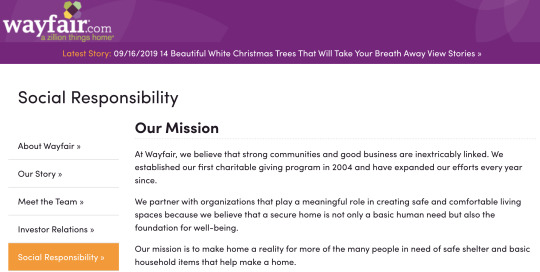
Prove It with Action: Words can only take a company so far. Instead of articulating the connection between the sale to BCFS with their values, Niraj Shah, Wayfair’s CEO, took a defensive stance and stated "it is standard practice to fulfill orders for all customers” and that they “sell to any customer who is acting within the laws of the countries within which we operate." They also intentionally ignored the request of their employees to donate to RAICES and instead donated to the Red Cross, which was half of what they earned from their BCFS sale. Both the words and actions of Wayfair showed a total disregard for their employees’ requests and desired outcomes.
Conduct Public Relations as if the Whole Enterprise Depends on It: They did not consider how the optics of their B2B sales with migrant detention center government contractors may seem to consumers and employees. Due to this, Wayfair opened itself up to criticism. Dedicating attention to consumer and societal trends could have helped avoid this situation to begin with. A 2018 Edelmen Earned Brand Study showed “that nearly two-thirds (64 percent) of consumers around the world now buy on belief” (Earned Brand 2018, 2019). This is up from 2017.
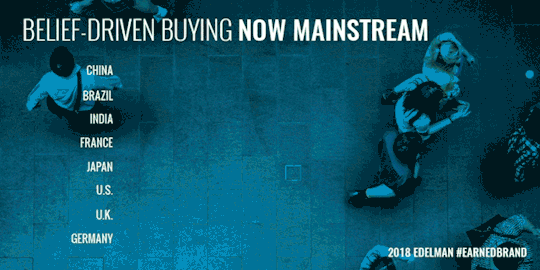
As a company based in the U.S., they would have benefited from educating themselves on the fact that a majority of Americans (62 percent) disapprove of the way migrants are treated at the border (Agiesta, 2019). This potentially translates into nearly 6 out of 10 people in their workforce having strong opinions on anything related to migrant treatment at the border. As of now, the financial effect this may have on Wayfair’s bottomline is yet to be determined. Brand loyalty may be a factor in the company's reported 40 percent more sales compared to last year. However, the company also reported a larger loss compared to last year. A year ago, they had a $100.7 million loss compared to $181.9 million this year (Thomas, 2019). With all the public attention on the company after the walkout, there may be a sense of urgency to invest more money into public-facing communications such as customer service and advertising. Time will tell if this strategy proves effective.
Sources
Agiesta, Jennifer. (2019, 2 July). CNN Poll: Three-quarters of Americans say there's a crisis at the border. CNN. Retrieved from https://www.cnn.com/2019/07/02/politics/cnn-poll-immigration-border-crisis/index.html
Bhattarai, Abha. (2019, 26 June). ‘A cage is not a home’: Hundreds of Wayfair employees walk out to protest sales to migrant detention center. The Washington Post. Retrieved from https://www.washingtonpost.com/business/2019/06/26/cage-is-not-home-hundreds-wayfair-employees-walk-out-protest-sales-migrant-detention-center
Earned Brand 2018. (2018, 2 October). Edelman. Retrieved from https://www.edelman.com/earned-brand
Klar, Rebecca. (2019, 26 June). Wayfair to donate $100,000 to Red Cross after employee protest over furnishing border facilities. The Hill. Retrieved from https://thehill.com/latino/450493-wayfair-to-donate-100000-to-red-cross-after-employee-protest-over-furnishing-border
Mabud, Rakeen. (2019, 12 July). Two Lessons From The Wayfair Walkout. Forbes. Retrieved from https://www.forbes.com/sites/rakeenmabud/2019/07/12/two-lessons-from-the-wayfair-walkout/#28c925cf3a88
Matsakis, Louise. (2019, 26 June). Wayfair Employees Are Walking Out. Here's Why. Wired. Retrieved from https://www.wired.com/story/wayfair-walking-out-border-detention
Social Responsibility. (n.d.). Wayfair. Retrieved from https://www.wayfair.com/v/about/social_responsibility
The Page Principles. (n.d.). Arthur W. Page Society. Retrieved from https://page.org/site/the-page-principles
Thomas, Lauren. (2019, 1 August). Wayfair shares whipsaw as costs build up and loss widens. CNBC. Retrieved from https://www.cnbc.com/2019/08/01/wayfair-reports-fiscal-q2-2019-earnings.html
Wischhover, Cheryl. (2019, 28 August). Wayfair, the internet’s massive online furniture store, explained. Vox. Retrieved from https://www.vox.com/2019/8/28/20833645/wayfair-many-brands-websites
#PRAD564#Wayfair#WayfairWalkout#WayfairMissteps#MigrantDetentionCenters#PublicRelations#ArthurPageSociety#PagePrinciples#Protest
0 notes
Text
White Claw Summer Leads to White Claw Shortage
By Joe Lanzerotti
Summary of Story
White Claw is an alcoholic beverage that was introduced into the market in 2016. It is owned by Mark Anthony Brands, the same company that produces Mike’s Hard Lemonade. White Claw is a hard seltzer, which is different than a spiked seltzer. A hard seltzer is brewed from fermented gluten-free grains, which produce a clear, flavorless alcohol that is then flavored and sweetened with cane sugar (Bryson, 2019). This is important because beverages that are brewed instead of spiked are taxed at a cheaper rate by the federal government, and can be sold in stores for a lower price. White Claw is affordably priced, has low sugar content, contains approximately 100 calories per drink, and includes 5% alcohol content by volume. The alcohol content is comparable to many light beers, while the calorie count and sugar content tend to be lower (Valinsky, 2019).

White Claw sales have experienced triple digit growth annually since the product was introduced to the market in 2016. In the past year alone, Nielsen and the New York Times report that “dollar sales [are] up 250 percent” (Bromwich, 2019). However, this massive growth has led to shortages across the country. In order to make sure that White Claw would be available in all markets, the company imposed an allocation limit for liquor stores and bars everywhere (Garrand, 2019). This means that no matter what the stores ask for when they order, they are allotted a certain amount that they can get. If a liquor store requests 100 cases of White Claw because they know that they can sell that in a week, they might only receive 40 cases due to the allotment. In this instance, this helps White Claw keep its product distributed across the country equally, but hurts the individual store that is now missing out on the sales of 60 more cases per week.
Forbes contributors David Sturt and Todd Nordstrom summed up the White Claw shortage well when they said that it “seem[s] like a perfect publicity stunt until you consider just how much more product [White Claw] could have sold if they could predict such an overwhelming response and social media frenzy” (Sturt, Nordstrom 2019). In response to the shortage, a White Claw spokesperson said that “we are working around the clock to increase supply given the rapid growth in consumer demand” (Peterson, 2019). White Claw has mainly used Twitter to respond to their customer complaints as well. They have been using a mix of canned tweets that direct consumers to the ‘Contact Us’ section of their website, and personal replies to problems.

Reaction to Story
I believe that White Claw found itself in an interesting growth situation largely because of “meme culture”, and isn’t entirely to blame for the shortage of its products. Maintaining triple digit growth and 60% market share in a business that is booming almost overnight is a difficult challenge to face (Bromwich, 2019). White Claw has dedicated very little of its earnings and budget to marketing, and has chosen to let the masses tell their story for them. This has led to the borderline ‘viral sensation’ nature of its success, but it has also left a lot to be desired when it comes to owning up to their shortcomings. Real small businesses are losing money because White Claw can’t keep up with the demand, and not enough has been done from a communication standpoint to help alleviate those pains in the industry.

Listen To Stakeholders
The Arthur Page Principle Listen To Stakeholders is not being met at this time (The Page Principles, n.d.). Responding to a handful of customer complaint tweets a day with canned responses is killing any potential conversation that could be happening between the company and its stakeholders. The same can be said about the liquor store owners- more transparency is needed to help them manage the public’s expectations about when White Claw will be back in stock, and how much will be delivered per shipment.
Manage For Tomorrow
Another relevant Arthur Page Principle in this situation is to Manage For Tomorrow (The Page Principles, n.d.). White Claw rose to power largely because of meme culture and the younger demographic supporting it with Instagram pictures, Twitter jokes, and Snapchat stories. This narrative can quickly turn sour if White Claw fails to keep up with the demand. The popular hashtags #WhiteClawSummer and #WhiteClawWednesday have slowly been replaced with #WhiteClawShortage. If this trend keeps up, White Claw could become a 2019 fad, soon to be replaced by another trendy drink that can match the growing consumer demand for beer and wine alternatives.

Conduct Public Relations As If The Whole Enterprise Depends On It
The final Arthur Page Principle I would like to examine for this case study is Conduct Public Relations As If The Whole Enterprise Depends On It (The Page Principles, n.d.). White Claw has not been adhering to this principle, but it makes sense as to why they might be hesitant to launch a public relations campaign at this point in time. They grew exponentially without the help of a massive marketing budget. They purposely like to remain open to all audience segments and all kinds of people. If they were to launch anything too flashy at this time, it could backfire and turn their consumer base away from them. White Claw has allowed its younger fans to assign value to their brand through memes and internet jokes. Instead of fighting the tide of public opinion, it might actually be best in this scenario to lay low until a solution is really ready. When that time comes, it will be interesting to see how White Claw approaches their communication strategy. In the meantime, it is important for White Claw to ramp up its efforts in using Twitter to communicate with disgruntled customers and business owners alike who are being affected by the White Claw shortage.
Sources
Bromwich, Jonah Engel. (2019, 5 September). The memes are pouring the White Claw down your throat!. The New York Times. Retrieved from https://www.nytimes.com/2019/09/05/style/white-claw-popular-memes.html
Bryson, Lew. (2019, 10 September). How the hell is White Claw hard seltzer outselling Budweiser?. The Daily Beast. Retrieved from https://www.thedailybeast.com/how-the-hell-is-white-claw-hard-seltzer-outselling-budweiser?ref=scroll
Garrand, Danielle. (2019, 7 September). There is a nationwide shortage of White Claw hard seltzer. CBS News. Retrieved from https://www.cbsnews.com/news/white-claw-shortage-there-is-a-nationwide-shortage-of-white-claw-hard-seltzer/
Nordstrom, Todd & Sturt, David. (2019, 19 September). How the White Claw shortage in the U.S. could expose an international leadership crisis. Forbes. Retrieved from https://www.forbes.com/sites/davidsturt/2019/09/19/how-the-white-claw-shortage-in-the-us-could-expose-an-international-leadership-crisis/#500223866935
The Page Principles. (n.d.). Retrieved from https://page.org/site/the-page-principles
Peterson, Haley. (2019, 6 September). White Claw says it’s ‘working around the clock’ to increase production of the wildly popular hard seltzer amid complaints of shortages across the US. Business Insider. Retrieved from https://www.businessinsider.com/white-claw-shortages-increase-supply-2019-9
Valinsky, Jordan. (2019, 6 September). America is running out of White Claw hard selrzer. CNN Business. Retrieved from https://www.cnn.com/2019/09/06/business/white-claw-shortage-trnd/index.html
0 notes
Text
Google+: How Safe is Our Data?
By: Justin Richardson

Summary
Google Plus was first launched back in 2011, as one of Google’s attempts to occupy the expansive social media market. Since its initial launch, the platform has grown to house “395 million active monthly users” with a little over half of those users residing in the United States (Stout 2018). The platform was originally intended to compete with social media companies, such as Facebook, and represented Google’s ability to layer social media across all of Google’s current and future products.
Google Plus grew tremendously within the first few years, reaching 540 million registered users by October 2013. The major problem for the social network was that people were registering for Google Plus out of convenience alongside other Google products, but were not engaging with Google Plus as a platform. In January 2012, it was reported that a person “spent an average of 3.3 minutes on Google Plus versus 7.5 hours on Facebook” (Wasserman 2012). This eventually put Google Plus in a state of stasis, resulting in the platform becoming more of a data collection avenue for Google rather than a direct competitor to other social networks.
In March 2018 however, the platform resurfaced again when Google identified a program bug within Google Plus itself (MacMillan 2018). The bug allowed app developers to access accounts you connected with to collect your own private data without your permission. Google continued to research and monitor the bug and concluded that the program had existed since 2015. They also identified that approximately 500,000 people could have had their private data accessed by and outside developer, but because Google kept limited activity logs they couldn’t verify an exact number (MacMillan 2018).

Google opted not to publicly share the data breach until October 8th, 2018, on the grounds that they had no evidence that any user accounts were breached during the time-frame the bug existed. When asked about the decision a spokesperson for google said:
“In weighing whether to disclose the incident, the company considered whether we could accurately identify the users to inform, whether there was any evidence of misuse, and whether there were any actions a developer or user could take in response. None of these thresholds were met here.” (MacMillan 2018).

On cue with the October 8th announcement, Google’s stock dropped about $20 per share from the opening price to the afternoon. However, by the end of the day the stock had bounced back and was only down $5 a share at the closing of the day. The stock turn could be attributed to Google’s announcement to shut down Google Plus by August 2019, which was announced alongside the data breach information. This announcement generated mostly neutral to positive reactions by the general public as seen below:

Reaction
After researching the Google Plus data breach and comparing them to the Page Principles, there were definitely some areas Google could improve upon regarding its corporate communications. I think the one principle Google strayed away from was Telling the Truth, specifically in the way they handled the data breach incident and announcement. On the other hand, Google did a nice job of Proving it with action after the announcement and even demonstrated the ability to Manage for Tomorrow by using internal audits and new security measures.
Tell the Truth
Google didn’t exactly uphold the first Page Principle with its decision to keep the data breach private for 7 months before the announcement. From a legal standpoint, Google did not have to disclose the data breach because there was no evidence any users were directly affected, so from a legal perspective they didn’t do anything wrong. I think this falls into the moral area of telling the truth, and is exemplified by Google’s decision to prioritize its reputation over its users safety. At the time the breach was detected, Facebook was going through its own investigation about data privacy and the general opinion by the public was negative. Google opted to keep the breach internal in order to remain out of the privacy breach spotlight (MacMillan 2018).
Prove it with Action/ Manage for tomorrow
Google’s reaction to the data crisis was extremely strong and was showcased by their decision to shut down Google Plus over a year’s time frame. This is also apparent with Google’s decision to implement an internal task force to examine their API security when it comes to app developer access. The task force found the problem with the Google Plus API and they were able to fix the problem before anyone else was affected. They’ve also implemented this task force to provide audits on all Google services in an attempt to avoid these errors and breaches in the future. Overall, Google followed these principles on more of an internal basis rather than an external communication strategy. Since the announcement of the breach Google has let the buzz around the story to simmer down and hasn’t continued with any future plans for security safety.
References
“GOOG Interactive Stock Chart | Alphabet Inc. Stock.” Yahoo! Finance, Yahoo!, 2018, finance.yahoo.com/chart
MacMillan, Douglas, and Robert McMillan. “Google Exposed User Data, Feared Repercussions of Disclosing to Public.” The Wall Street Journal, Dow Jones & Company, 8 Oct. 2018, www.wsj.com/articles/google-exposed-user-data-feared-repercussions-of-disclosing-to-public-1539017194.
Stout, Dustin W., and Dustin W. StoutA. “Social Media Statistics 2018: What You Need to Know.” Dustn.tv, 19 Oct. 2018, dustn.tv/social-media-statistics/#google-plus-stats.
“The Page Principles.” Page Society, Arthur Page Society, page.org/site/the-page-principles.
Wasserman, Todd. “Google Plus Users Spent Just 3.3 Minutes There Last Month.” CNN, Cable News Network, 28 Feb. 2012, www.cnn.com/2012/02/28/tech/social-media/google-plus-comscore/index.html.
0 notes
Text
Glossier: A Case Study in ‘Managing For Tomorrow’ & ‘Listening to Stakeholders’
Antoinette Iacullo

SUMMARY OF THE BRAND
New York-based ecommerce beauty startup, Glossier, launched online in 2014 with just four products. It has since expanded to a full line of skincare, makeup, body & fragrance products. It closed a Series C round of funding earlier this year, raising $52 million, bringing total funding to $86 million (Mandell, 2018). Rumors of an initial public offering began to simmer after the last funding round (Basin & Wolf, 2018).

Communication to Stakeholders (February 22, 2018)
Glossier’s valuation reached $390 Million this year (Olsen 2018).Traffic is heavy, both literally and digitally— Its flagship NYC store does more sales per square foot than the average Apple Store (Gingras 2018) and there are more than two million unique visitors a month to the brand’s beauty blog, Into the Gloss (Bhuiyan 2018).
Dear Tech People reports 79% of Glossier’s staff is female, including its CEO, Emily Weiss. Weiss, 33yrs old, went from Teen Vogue Intern to beauty blogger to the ‘Estee Lauder for millennials’ in roughly three years (Mandell 2018). You may remember Weiss from her cameo as Super Intern on the MTV series ‘The Hills.’

Above: Then, 2007.
Below: Now, 2018.

Photograph by Ben Hassett
youtube
Emily Weiss (Glossier) & Kirsten Green (Forerunner Ventures) | Disrupt SF
Another titan of retail, Katrina Lake, Founder and CEO of Stitch Fix, the youngest female founder to take a company public, joined Glossier’s board of directors in June. Lake is the first independent director to join the board, which includes Weiss, Glossier president Henry Davis and three venture capitalists (Del Rey, 2018).

Glossier is simultaneously innovating and disrupting ecommerce, with its tech-forward, direct-to-customer product and communication business model. It has a strong brand identity, synonymous with ‘Millennial pink’ and minimalist aesthetic, with a mission to serve as a conduit for connection. Glossier’s value is not in the sheer scale of its user base, rather, the social activity happening on its user network (Andjelic, 2018). And I would argue, much of Glossier’s value is its People Capital.
MY MUSINGS & REACTION
In a study of the 4-year old startup, via the lens of The Page Principles, ‘Manage For Tomorrow’ and ‘Listen to Stakeholders’ are seemingly embedded in Glossier’s core tenets. Meanwhile, ‘Conduct public relations as if the whole enterprise depends on it’ is a work in progress for this rapidly evolving Brand. And one I believe will only become more challenging, given Glossier does not appear to have a Chief Communications Officer; Instead, Weiss serves as the foremost voice and image of the Brand.
Manage For Tomorrow
Weiss believes “we’re really at the dawn of ecommerce,” which makes up just about 10% of global commerce (Olsen, 2018). “My job is to be thinking 12 months to two years ahead,” she writes in an ITG blog post (https://intothegloss.com/2016/01/meet-emily-weiss/).
Glossier quietly acquired Montreal Digital agency, Dynamo, at the close of 2017. Dynamo helped Glossier with its U.S. launch, developing its website and ecommerce platform. Following the acquisition, Dynamo Co-Founder Bryan Mahoney was named CTO at Glossier (Kolm, 2018).
With the additional venture capital funding injected in February, Glossier is preparing to enter “Phase Two,” creating a social-commerce site. Though Glossier’s Instagram account has roughly 1.5 million followers, Weiss wants to build her own version of a social media and shopping mashup and she hired Keith Peiris, a developer who led teams at Instagram, Facebook Inc., and Oculus, as Glossier’s product chief to spearhead the new site (Perez, 2018).
Listen to Stakeholders
Glossier launches a new product every six weeks, on average, and spends a lot of time working on its formulas and engaging in two-way conversation between product teams and its user community. For example, crowd-sourcing input to co-create its cornerstone product, Milky Jelly Cleanser and inviting 100 of Glossier’s top customers to participate in a Slack channel, exchanging thousands of messages weekly. “That’s the difference between a marketing tactic and actually having your customer engaged in your process and your brand,” says Weiss (Chapin, 2016).


How to not conduct PR as if the whole enterprise depends on it
Glossier has been criticized for not being particularly concerned with explaining the science behind its products, “Weiss just doesn’t think her customers care about ingredients if they’re happy with the results,” according to a spokesperson for Glossier (Larocca, 2018). But Glossier claims that its lack of transparency is a matter of safeguarding business assets.

Glossier received backlash in response to its Instastory thread, which promoted the benefits of Glossier’s Solution, a chemical exfoliating toner, while slamming competing products from industry-revered brands, like Biologique. Many felt Glossier was ill-positioned to opine on other acid formulas when the percentages of its proprietary acid blend are not disclosed. Further, Glossier’s authoritative voice on chemical products felt ingenuine, when fragrance, a known skin irritant, is a listed ingredient in Glossier’s Solution. Further hypocritical, Glossier threw shade at the same competitors that it previously lauded on Into the Gloss.
Luckily, Glossier’s brand image of inclusivity and transparency seems largely intact since its very off-brand misstep, but as Warren Buffet has cautioned, it takes significantly less time to ruin your reputation than it takes to build it.
SOURCES
Andjelic, A. (2018, October 19). Opinion: The ‘4 Cs’ of the modern beauty brand. Glossy. Retrieved from http://db.glossy.co/platform-effect/opinion-the-4-cs-of-the-modern-beauty-brand
Bhasin, K. & Wolf J. (2018, August 30). Inside Glossier’s plans to shake up your makeup routine. Bloomberg. Retrieved from https://www.bloomberg.com/news/features/2018-08-30/millennial-makeup-brand-glossier-shakeup-makeup-routine
Bhuiyan, J. (2018, September 18). Emily Weiss wants Glossier to own the online beauty conversation. Recode. Retrieved from https://www.recode.net/2018/9/18/17869814/glossier-emily-weiss-makeup-beauty-engagement
Chapin, A. (2016, January 11). Emily Weiss explains why people are freaking out about Glossier. Racked. Retrieved from https://www.racked.com/2016/1/11/10749536/glossier-emily-weiss-into-the-gloss-new-cleanser
Del Rey, J. (2018, June 26). Stitch Fix CEO Katrina Lake has joined the board of Glossier. Recode. Retrieved from https://www.recode.net/2018/6/26/17501370/katrina-lake-glossier-board-director-stitch-fix
Gingras, M. (2018, April 18). While retail’s behemoths die, these 4 retailers are rising from their ashes. Entrepreneur. Retrieved from https://www.entrepreneur.com/article/312112
Kolm, J. (2018, March 2). Glossier acquired Dynamo. Strategy. Retrieved from http://strategyonline.ca/2018/03/02/glossier-acquires-dynamo/
Larocca, A. (2018, January 8). The magic skin of Glossier’s Emily Weiss. New York Magazine. Retrieved from https://www.thecut.com/2018/01/glossier-emily-weiss.html
Mandell, J. (2018, February 22). Glossier just got $52 million in fresh capital, bringing total funding to $86 million. Forbes. Retrieved from https://www.forbes.com/sites/jannamandell/2018/02/22/glossier-just-got-52-million-in-fresh-capital-bringing-total-funding-to-86-million/#1a1dd56412b6
Olsen, D. (2018, September 2018). The changing face of beauty brands in an Instagram-obsessed world. PitchBook. Retrieved from https://pitchbook.com/news/articles/the-changing-face-of-beauty-brands-in-an-instagram-obsessed-world
Perez, S. (2018). Glossier CEO Emily Weiss on why the company won’t sell to Amazon. Tech Crunch. Retrieved from https://techcrunch.com/2018/09/07/glossier-ceo-emily-weiss-on-why-the-company-wont-sell-on-amazon/
0 notes
Text
Our Twitter Cries Have Been Heard….Toys “R” Us is Back?!

By Taylor Pecko-Reid
SUMMARY
Video: https://twitter.com/ShibaRussell/status/1012815558792876033
Toys “R” Us, the international toy, clothing, baby and video game retailer has been a pivotal part of childhoods throughout the generations. Toys “R” Us was home to many of the items on your Christmas wish list, where you went for last minute gifts for your friends, and even where your parents found discounted diapers. The company, which was founded more than 70 years ago, served communities as a one-stop-shop for countless years, but slowly began losing its footing once newer stores were introduced and the market landscape shifted.
Before they knew it, the market completely changed. Instead of completing a scavenger hunt throughout the aisles of Toys “R” Us, one could now order items online and have them shipped straight to their door. As the market began to shift, Toys “R” Us was slow to adapt to the changes. Years passed and poor holiday sales began to pile up, a shift to more play time on mobile devices continued and competition from online and discount stores began to increase. Due to the inability to keep up, the company filed for bankruptcy in 2017. In March 2018, the company announced that all 740 of its U.S. stores would be closing. By June 29, 2018, the place that many of our most desired toys called home was emptied out and closed for good. The company closure signaled big changes to come in the suburban retail landscape (Covert, 2018).
Amid news that the store was closing, people took to Twitter to grieve Geoffrey and all the joy the store brought them:



But just as customers began to accept the fact the company was gone for good, they surprised us all. In early October 2018, Toys “R” Us signaled that it could make a comeback. Using its mascot, Geoffrey the Giraffe, the company shared a tweet that Geoffrey was ‘back from vacation’ (Walsh, 2018). This tweet was shared just days after news of a potential comeback was discussed within a press release from Geoffrey LLC, the company that holds Toys R Us' intellectual property. Within the press release, the owners stated that existing lenders would acquire the company’s assets and take on a wholesale toy venture called Geoffrey's Toy Box. In addition, the press release revealed plans of creating pop-up shops inside future stores during the holiday seasons.

REACTION
The announcement came as a surprise to many as just a few months prior the company filed for bankruptcy, shut down, and laid off its entire workforce. The company, under its new owners, shared that they are actively working with potential partners to develop ideas for new Toys “R” Us and Babies “R” Us stores in the United States and abroad that “could bring back these iconic brands in a new and re-imagined way.” But is this what we really wanted? While some shared positive remarks, memes and even GIFs about the company’s revival, many were very angry to hear about the quick comeback.
“You liquidate your assets, you close stores, you layoff all your employees, you owe vendors millions of dollars...and then you turn around and say "never mind?" Until employees and vendors get their money, #ToysRUs can stay dead as far as I'm concerned,” said one tweet.
While lenders, new owners and even some customers were happy to hear of the potential comeback, the company’s revival left a bad taste in the mouths of the many men and women who lost their jobs. Many job unions, former employees and the general public have run to Twitter to share their disdain.
PAGE PRINCIPLES
3. Listen to Stakeholders
Toys “R” Us failed to treat each of its stakeholders equally. While the company worked to find ways to keep its customers and lenders happy, they completely neglected the feelings of workers who were laid off amid the closing of the stores. On one hand, customers are overjoyed to hear that the nostalgic brand has potential to revive itself. In addition, lenders have an opportunity to still generate funds even after bankruptcy because they have access to the company’s assets in full. However, workers who dedicated their time to the store aren’t being cut a deal. Upon the closure announcement in January, over 31,000 employees were laid off (Walsh, 2018). Now with a potential comeback in the works and Geoffrey being back from vacation, they sadly are not reaping any benefits from the revival. Ignoring key stakeholders has left many consumers with no choice but to turn their back on the company.
5. Conduct public relations as if the whole enterprise depends on it.
Toys “R” US failed at Page Principle #5 because they did not consider all parties. For starters, the way the company announced bankruptcy and closure was very abrupt, with many of their employees unaware that their jobs were at risk. In addition, they worked to find solutions to alleviate the grief of consumers and lenders, but failed to consider workers who dedicated their time and energy to the business. It’s clear that the company didn’t take into consideration the negative backlash they’d receive upon revival. Their PR efforts should’ve encouraged their enterprise’s decision making, but instead they were selfish and chose money over their employees.
2. Prove it With Action
While lenders of Toys “R” Us have mentioned a lot of the potential plans they have in place for the company and it’s rebranding, all of this is simply just talk until we see otherwise. The company has the perfect opportunity to capitalize on the nostalgic feeling that it brings and use that to drive their sales. According to The Columbian, U.S. toy sales from January through June increased 7 percent to $7.9 billion, according to NPD. Last year, toy sales increased 1 percent to $20.7 billion from 2016. These numbers can easily be attributed to the announcement made by Toys “R” Us. If they are able to stick to their word and revive the company, they have an opportunity to regain footing.
In the future, I can only hope that Toys “R” Us can both successfully find a way to make amends with its laid off workers and become a major name within the toy industry again. Its sad to see an era die, but if a revival is in the works, its important to consider all parties before making any PR decisions. If the company would’ve planned out their announcements in a more respectful manner, they might’ve received a more positive response in regards to their resurrection.
SOURCES
Bates, Josiah. “'Goodbye Childhood': People Share Memories Toys 'R' Us after the Iconic Toy Store Announces Its Closing.” ABC News, ABC News Network, 15 Mar. 2018, abcnews.go.com/US/goodbye-childhood-people-share-memories-toys-us-iconic/story?id=53768986&cid=social_twitter_abcn.
Covert, Bryce. “The Demise of Toys 'R' Us Is a Warning.” The Atlantic, Atlantic Media Company, 14 June 2018, www.theatlantic.com/magazine/archive/2018/07/toys-r-us-bankruptcy-private-equity/561758/.
Jones, Charisse. “Toys R Us Has a Plan to Save Itself and It's Unreal.” USA Today, Gannett Satellite Information Network, 2 Oct. 2017, www.usatoday.com/story/money/2017/10/02/toys-r-us-has-plan-save-itself-and-its-unreal/702205001/.
Wls. “The End of Toys 'R' Us: Everything You Need to Know.” ABC7 Chicago, 25 June 2018, abc7chicago.com/shopping/the-end-of-toys-r-us-everything-you-need-to-know/3650601/.
ComicBook. “Toys 'R' Us Relaunching As Geoffrey's Toy Box.” Comicbook.com, ComicBook.com, 9 Oct. 2018, comicbook.com/2018/10/09/toys-r-us-relaunching-geoffreys-toy-box/.
“ToysRUs (@ToysRUs) | Twitter.” Twitter, twitter.com/toysrus.
Walsh, John. “Toys R Us Is Hinting at a Post-Bankruptcy Revival and Some Former Employees Are Not Happy about It.” Business Insider, Business Insider, 10 Oct. 2018, www.businessinsider.com/toys-r-us-comeback-bankruptcy-former-employees-react-2018-10.
0 notes
Text
Pret a Manger Feels the Heat After Second Customer Death

Summary
Pret a Manger is a London-based global chain of 530 sandwich and coffee shops, 90 of these located in the U.S. Back in September of 2016, a report was released stating the death of a British teenager, Natasha Ednan-Laperouse. The teenager, who suffered from a severe allergy to sesame seeds, consumed a Pret a Manger baguette whose label did not state that sesame seeds had been baked into its dough. Natasha was on a plane and suffered cardiac arrest. She died shortly after.
The coroner who handled this matter, Sean Cummings, ruled that while Pret did not technically break the law, the lack of the allergen information expresses that the company was not taking this matter as seriously as it should have. To note, Pret is an international company and regulations vary when it comes to food labeling. For example, in Britain, Pret is not required to label individual food products because they are assembled on the premise versus being bought from a third party. However, in the inquest relating to Natasha’s death, it states that the company had been warned six times of allergic reactions to its baguettes prior to her death. Following this report, Pret a Manger’s CEO, Clive Schlee released the following statement on the company’s Twitter account on September 28, 2018:

Schlee even followed this up with another Twitter statement less than a week later that explained how Pret would prevent this issue from happening again stating that it would be rolling out full ingredient labelling on product packages in all U.K. shops right away. They also reiterated this matters importance to the company and their dedication to customer safety.

Unfortunately, another statement was released on October 7, 2018 stating that another customer had died after purchasing a non-dairy flatbread sandwich made with a non-dairy yogurt product called COYO which was later found to contain traces of dairy protein. The customer was not identified in the post and died in December 2017. Following this second death, Pret ended its relationship with COYO and released another statement via Twitter:

Reaction:
I think that Pret a Manger certainly made an effort to alleviate this PR crisis. However, since the magnitude of the crisis was relatively high due to it involving multiple deaths of customers, I feel that the sense of urgency was just not there. After the first death, I wonder why it took over 2 years for the inquest to come out. This also took away from the CEO’s statement via Twitter. Additionally, this also did not help Pret’s cause when the second death announcement was made just over a week later. Pret should have acted sooner with addressing this issue. I do believe that they took somewhat of a stance with the Page Principal, “Prove it with action.” I think it was more effective that CEO, Clive Schlee, posted a follow up tweet stating in more detail what Pret plans on doing to ensure this will not happen again. It is, however, too soon to evaluate if they actually followed up with it since this tweet was sent out just over a week ago. It can be very detrimental to their brand if they do not follow up with these actions.
I believe the Page Principal that they resonated with the most would be “Tell the truth.” They did not try to cover up the matter or put some sort of “spin” on it to make the situation sound less crucial than it actually is. The third Page Principal to associate with this is “Manage for tomorrow.” I do think they could have gotten ahead of the situation with “COYO” by testing the products they use in their food before selling it to the public rather than after a crisis occurs. In closing, the promises made by Schlee may sound good on paper (or Twitter) but they will lose all value and actually make the company look worse if they are not enforced and done so as soon as possible.
Page Principals:
Prove it with action: As I mentioned, the follow up tweet by Schlee stating in more detail what Pret plans on doing to ensure this will not happen again, he took it one step further than the typical apology statement. It is, however, too soon to evaluate if they actually followed up with it since this tweet was sent out just over a week ago. It can be very detrimental to their brand if they do not follow up with these actions.
Tell the Truth: They did not try to cover up the matter or put some sort of “spin” on it to make the situation sound less crucial than it actually is.
Manage for Tomorrow: I do think they could have gotten ahead of the situation with “COYO” by testing the products they use in their food before selling it to the public rather than after a crisis occurs.
References:
The New York Times. “Pret A Manger Says a 2nd Customer Died of Allergic Reaction.” The New York Times, The New York Times, 7 Oct. 2018, www.nytimes.com/2018/10/07/business/uk-pret-a-manger-allergy.html.
CNBC. (2018). Pret a Manger says 2nd customer died from allergic reaction. [online] Available at: https://www.cnbc.com/2018/10/08/pret-a-manger-says-2nd-customer-died-from-allergic-reaction.html [Accessed 12 Oct. 2018].
Jennings, H. (2018). Pret A Manger Reaffirms Commitment to Labeling After Second Death. [online] PR News. Available at: https://www.prnewsonline.com/pret-a-manger-reaffirms-commitment-to-labeling-after-second-death [Accessed 12 Oct. 2018].
0 notes
Text
We Will Be Heard: The Chicago Hotels Strike
Summary
In early September, following an extremely successful summer for tourism in Chicago, over 20 hotels were involved in a contentious negotiation with thousands of hotel union workers. The ineffective negotiations led to a month long strike, nearing its end around October 5. Major hotel brands including Hyatt, Marriott and Sheraton - two of which are subsidiaries of Starwood Hotels - were affected. The Hyatt Regency Chicago, Palmer House Hilton, J.W. Marriott and more feature massive venue spaces, causing even greater disturbances (Lazare, 2018).
Although leisure tourism begins to slow down following Labor Day, industry conferences ramp up, which affects regular service for conventioneers. According to the Chicago Tribune, the Democratic Attorney Generals Association and the Midwest LGBTQ Health Symposium both decided to move their conference locations to stand in solidarity with strikers (Elejalde-Ruiz, 2018).
Marriott and Hyatt International have discussed their disappointment with the strikes, and the Hyatt Regency Chicago even attempted to block protestors with two large buses. Hilton Hotels and Resorts praised hotel managers for stepping up and welcomed union employees back to work by saying, “We’ve had the benefit of our managers from around the country as well as our local Chicago hotels take on the roles of housekeeper, server and doorman. More and more of our union team members are choosing to return to work and we welcome them to do so.”
Workers are striking for consistent hours following peak season as well as adequate health coverage. Several of the hotel brands have responded positively to negotiations and as of October 9, only two hotels remained in negotiations (Kelly, 2018).

Reaction
As mentioned, several conferences chose to stand in solidarity with the protestors, as well as many guests visiting the 26 hotels. Other workers that did not strike spoke of their support and managers and fellow union workers could be seen watching from nearby throughout the past month. There have been some critics though. The Illinois Hotel and Lodging Association CEO, Marc Gordon stated that “Today’s labor strike is most unfortunate as the hotel industry is committed to the employees who make up each and every property. It is their dedication that contributes to our city’s place as a leading tourism and convention destination. We respect the voices of our colleagues and are hopeful for a quick and amicable negotiation process for all” (Kelly, 2018).
Personally, as a graduate of a hospitality program and with extensive background knowledge of the inner workings of hotels, I wholeheartedly support the efforts of the union workers. Although I understand that the slow season of tourism affects income and it makes sense to decrease wages to maintain conservative expenses, the need for a livable wage outweighs cost-cutting organizations.

Page Principles
Prove it with action: Hilton’s mission statement is “to be the preeminent global hospitality company - the first choice of guests, team members, and owners alike.” They conformed to their beliefs by offering a contract that fulfilled the requests of their workers with year-round healthcare and wage increases.
Listen to stakeholders: The hotel brands that were involved remained in negotiations with union workers, earnestly addressing concerns. Hilton said, “We are pleases to have reached an agreement with UNITE HERE Local 1. We look forward to welcoming our Team Members back to work.”
Remain calm, patient and good-humored: Unlike other hotel brands like Hilton and Marriott, Hyatt International continually tried to derail protestors and released statements that were demeaning to negotiations. The vice president of labor relations for the Americas of Hyatt said, “The union is remaining uncooperative, further demonstrating that it has no desire to reach an agreement. We remain committed to finalizing an agreement and hope the union is as well” (Elejalde-Ruiz, 2018). This statement is counterproductive to the cause and may explain the delay in an agreement.
SOURCES
Elejalde-Ruiz, Alexia. (2018, 13 September). One week into Chicago hotel worker strike, talks continue but no end in sight: ‘It’s going to be a long fight’. Chicago Tribune. Retrieved from http://www.chicagotribune.com/business/ct-biz-hotel-strike-hilton-contract-20180930-story.html.
Elejalde-Ruiz, Alexia. (2018, 30 September). Hotel strike ends at five more downtown Chicago hotels as workers at Hilton, Inn of Chicago ratify contracts. Chicago Tribune. Retrieved from http://www.chicagotribune.com/business/ct-biz-hotel-strike-hilton-contract-20180930-story.html.
Kelly, Brianna. (2018, 08 October). Hotel strike is down to 2. Chicago Business Journal. Retrieved from https://www.chicagobusiness.com/news/hotel-strike-down-2.
Lazare, Lewis. (2018, 05 September). Hyatt, Marriott, Hilton and Sheraton hotels hit by Chicago workers strike. Chicago Business Journal. Retrieved from https://www.bizjournals.com/chicago/news/2018/09/07/hyatt-marriott-hilton-and-sheraton-hotels-hit-by.html.
0 notes
Text
E-commerce giant returns back to retail – Amazon opened a store to sell 4-star + products
Summary of Amazon’s 4-star store opening
The e-commerce giant, Amazon, opened a permanent brick-and-mortar store in New York’s SoHo neighborhood which sells products from its website – which are rated 4 stars and above. This was Amazon’s latest step from the online store to physical retail after Amazon Books, Whole Foods, and Amazon Go, the cashier-free convenience store featuring advanced shopping technology.
Here’s how the store looks like:
youtube
This news created the monthly peak of Amazon’s stock price - $2012.98 – which means this announcement did give investors some confidence.

This news was issued on Amazon’s main vehicle for the news release: its blog – Day One. It stated that “we started with some of the most popular categories on Amazon.com including devices, consumer electronics, kitchen, home, toys, books, and games, and chose only the products that customers have rated 4 stars and above, are top sellers, or are new and trending.” The Twitter account – @Amazon News, tweeted the same news and posted a link to the official news blog. Consequently, 28 thousand people have watched the short video on Twitter, 179 people retweeted, and 460 people liked the post as of Oct 6, 2018.


The Reaction of Amazon’s 4-star store opening
About 68 results related to this news were shown on Google News on Sept 27, 2018, and two of them are Chinese and Japanese media. Public opinions show that people like Amazon’s concept and the display of the actual store.
Doug Stephens, an influencer of business and retail, tweeted that “Conspicuously absent from any reviews I’ve read of this store are words like ‘fun’, ‘surprising’ or ‘delightful.’ Amazon’s stores are pure left-brain. That doesn’t mean they won’t work. It just leaves room for more creative retailers to succeed.”
Since I’m from China - where e-commerce thrives extraordinarily - I cannot stop finding the differences in communication strategies between the two notable daily-used e-commerce platforms – Amazon of the U.S. and Taobao of China, which belongs to Alibaba Group. Having experienced the e-commerce service on both platforms, I think Amazon is an online retailer for both third parties’ and its own products in all categories. However, Taobao is more like a trading platform between buyers and sellers. In other words, Amazon and Taobao are not twins.

While browsing Amazon, there are three aspects that it want to emphasize: Prime memberships, repeat purchases, and Amazon-owned products. All of these aspects are leading towards one goal: loyalty to Amazon. Inventory is kept in Amazon’s warehouses and Amazon would take a portion of the sales price as commission. The brick-and-mortar stores, the Kindle e-reader, the one-click button, and Alexa all served as the cornerstones for Amazon to get more buyers involved and to promote consumption.
On the other hand, Taobao seems to put more efforts to get sellers’ attention, which means the third party sellers are actually its target audience. Instead of boosting up repeat purchases, Taobao is inclined to provide various products from different sellers that are associated with users’ searching words and even broaden the related range of goods to create a sense of need. Moreover, Taobao does not provide inventory or shipping service. Therefore, sellers’ advertising costs become the main revenue of Taobao. Additionally, Taobao’s slogan “Just buy whatever you want” demonstrates that “variety” is the key message that it wants to deliver.

In a nutshell, the news of opening a brick-and-mortar store was the significant step of Amazon’s strategic expanding to increase all stakeholders’ confidence. Also, it will eventually benefit Amazon’s online sales since the retail store plays the role of offering experience and exploration.


Page Principles
- Prove it with action
By opening a series of Amazon Books, Amazon Go, Amazon Pop-Up, Amazon college pickup and return centers, and Amazon Fresh Pickup, Amazon proves its business strategy to shareholders with actions. Moreover, Amazon proves its commitment to Prime members that provides a better price even in the brick-and-mortar store.
- Listen to stakeholders
After collecting data from customers – one of the stakeholder groups - for years, it is the right time for Amazon to utilize big data to serve consumers. The 4-star store concept reflects customers’ interests, buying trends, and the sense of needs. Therefore, Amazon can provide a better shopping experience both online and physically.
Reference
Day One Staff. (2018, Sep 26). Introducing Amazon 4-star. Amazon.com, Inc. Retrieved from https://blog.aboutamazon.com/shopping/amazon-4-star
Stevens, L. (2018, Sep 26). Amazon is opening New York Store to sell highly rated products. Dow Jones & Company, Inc. Retrieved from https://www.wsj.com/articles/amazon-is-opening-new-york-store-to-sell-highly-rated-products-1537998319
Thomas, L. (2018, Sep 27). Amazon just opened a new store that sells popular items from its website. Here's what it looks like inside. CNBC LLC. Retrieved from https://www.cnbc.com/2018/09/27/amazon-just-opened-its-4-star-store-in-new-york-heres-a-look.html
Gallun, A. (2018, Sep 17). Amazon opens first Chicago store. Crain Communications, Inc. Retrieved from https://www.chicagobusiness.com/commercial-real-estate/amazon-opens-first-chicago-store
0 notes
Text
Elon Musk’s $40 Million Tweet
SUMMARY
In August, Elon Musk tweeted that he was going to take the Tesla company private due to secured financing. His initial tweet mentioned that he would consider taking the company private for $420 a share. Due to securities fraud charges, the Securities and Exchange Commission has intervened and has demanded Musk pay a hefty fine. According to a recent article from the New York Times, “the settlement will force Mr. Musk to step aside as chairman for three years and pay a $20 million fine” (Goldstein, 2018). On top of Musk paying this fine, the Tesla company is responsible for paying a $20 million fine as well. While Musk is taking a three-year hiatus as chairman of the company, Tesla must add two new directors to the board. In addition, the company is responsible for monitoring Musk’s social media accounts. The purpose is to prevent Musk from sharing false or misleading information in the future. When Musk first learned about the SEC filing, he threatened to quit if the board of directors at Tesla decided to abide by the settlement. At that point, Tesla had to determine how important Musk was to the company. By not agreeing to the terms of the first settlement, Musk agreed on the second. The original settlement included a $10 million fine and that Musk step down for only two years. According to an article from Fortune,“still, investors are back. Stocks rose 15% on the new deal’s terms” (Laursen, 2018).

A press release issued by the SEC explains what Musk and Tesla are being fined for. The SEC states, “Musk had not discussed specific deal terms, including price, with any potential financing partners, and his statements about the possible transaction lacked an adequate basis in fact.” These false allegations made by Musk caused an increase in the company’s stock price. On the day of the tweet, Tesla stock price was $341.99 per share. The day after the tweet, it was $379.57. The tweet resulted in an 11% increase in stock price. As a result of the SEC settlement, CNN reporter Jordan Valinsky states, “The stock surged 17% on Monday.”
youtube
REACTION
There were many reactions regarding Musk’s controversial tweet. Many people on social media have argued that Musk should stay off social media and keep his thoughts to himself. Even though the tweet caused a lot of controversy for Musk and the Tesla company, the company’s stock is surging. As a result of the SEC filing, I believe it is crucial for Tesla to monitor Musk’s social media accounts. This specific tweet caused a lot of financial damage for Tesla. I think it’s in the best interests of the shareholders to monitor Musk. In 2013, Tesla announced that Musk’s Twitter account would be used to display information about the company. It seems as though the company should have been monitoring his posts since then.
Personally, I believe that Musk did the right thing by speaking with shareholders about taking the company private. However, he should have spoken to them before he made the tweet and cost himself and the company a combined total of $40 million. What confuses me is why Musk didn’t settle on the first terms of the SEC filing.
PAGE PRINCIPLES
Tell the truth: Since Musk’s controversial tweet, he used the Tesla website to update employees, shareholders and the public what his reasoning for the tweet was and has remained transparent since. In an article from the Los Angeles Times, Musk stated, “I have always taken action in the best interests of truth, transparency and investors. Integrity is the most important value in my life, and the facts will show I never compromised this in any way” (Miller & Mitchell, 2018).
Prove it with action: The board of directors at Tesla have agreed to monitor Musk’s social media and communication platforms. The company also agreed to pay a $20 million fine for Musk’s actions. By accepting these terms, the company is taking responsibility for Musk’s actions and is looking out for its shareholders.
Listen to stakeholders: Before posting the tweet, Musk had a conversation about taking the company private. As previously mentioned, Musk has used the company website to explain his reasoning behind the tweet. After speaking with and listening to stakeholders, he agreed that the company would be better off as a public company.
SOURCES
Goldstein, M. (2018, September 29). Elon Musk and Tesla Settle With S.E.C. in Fraud Case. Retrieved September 30, 2018, from https://www.nytimes.com/2018/09/29/business/tesla-musk-sec-settlement.html
Laursen, L. (2018, October 03). Tesla Had a Generous Offer to End the SEC Probe. Then Elon Musk Got Involved. Retrieved October 3, 2018, from http://fortune.com/2018/10/03/tesla-elon-musk-bad-deal-sec/
Miller, D., & Mitchell, R. (2018, September 29). Elon Musk gets off the ropes with SEC settlement, but Tesla still has a bruising fight ahead. Retrieved October 01, 2018, from http://www.latimes.com/business/la-fi-tesla-elon-musk-20180929-story.html
NBC News. (2018, October 01). Elon Musk Agrees To Pay $20 Million Fine In SEC Settlement | NBC Nightly News. Retrieved October 01, 2018, from https://www.youtube.com/watch?v=YU8OkP-UpF8
TSLA Interactive Chart | Tesla, Inc. Stock. (2018, October 02). Retrieved from https://finance.yahoo.com/quote/TSLA/chart
0 notes